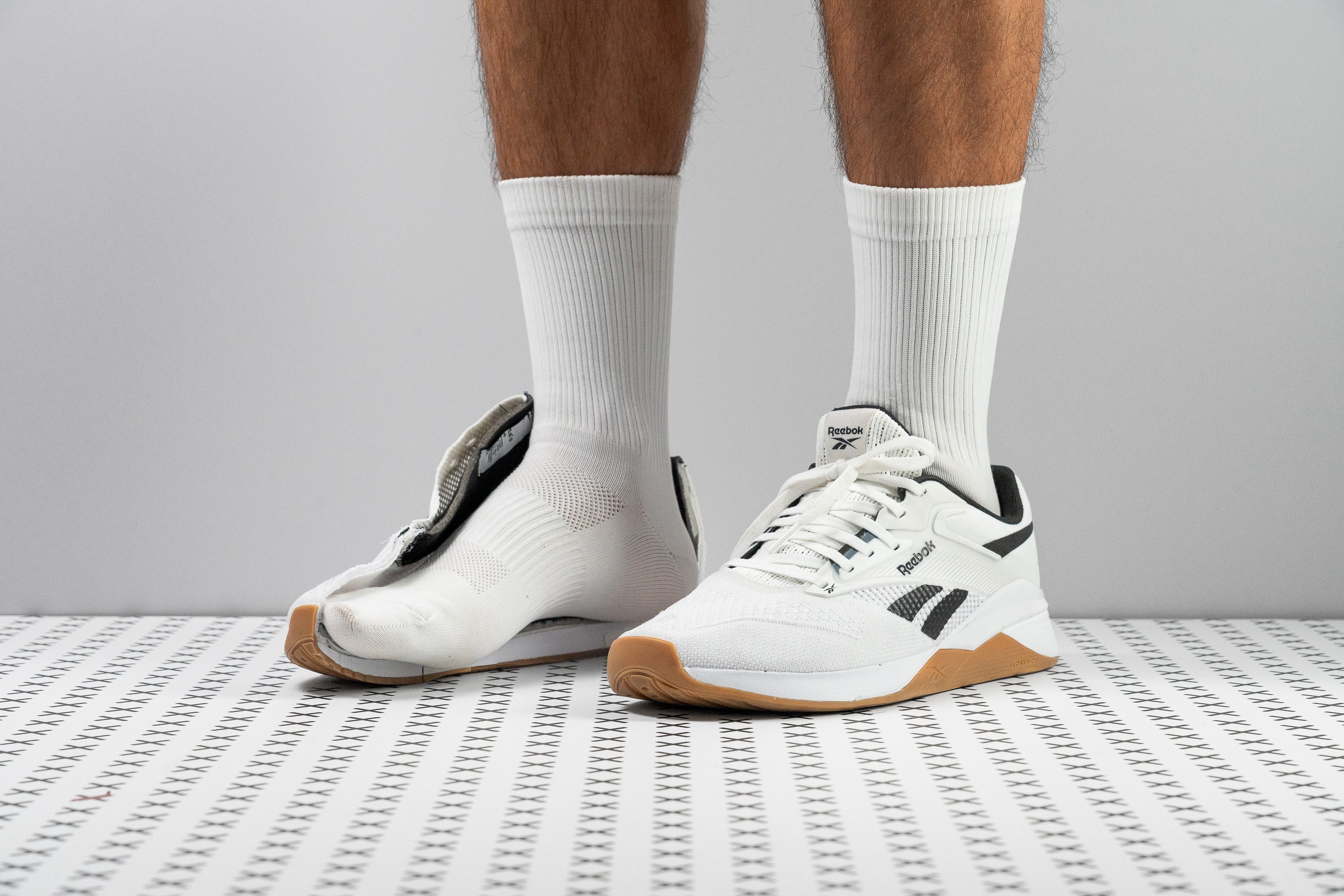Our verdict
Pros
- Fantastic wear resistance
- Great balance of cushioning and stability
- Feels grounded and supportive
- Secure foot lockdown
- A fully-gusseted tongue (finally)
- Nice breathability
- Lighter than the X3
- Great grip on gym floors
Cons
- Not for heavy lifting
- Not for wide feet
Audience verdict
- Top 15% most popular training shoes
Comparison
The most similar training shoes compared
+ + Add a shoe | |||||
|---|---|---|---|---|---|
| Audience score | 87 Great! | 87 Great! | 82 Good! | 87 Great! | |
| Price | $150 | $150 | $150 | $130 | |
| Use | CrossfitWorkoutCross-trainingGymHIITJumping ropeAll sports | CrossfitWorkoutCross-trainingGymHIITAll sports | CrossfitWorkoutCross-trainingGymHIITJumping rope | CrossfitWorkoutCross-trainingGymHIITJumping ropeAll sports | |
| Shock absorption | Moderate | Low | Low | - | |
| Energy return | High | Moderate | High | - | |
| Traction | Moderate | Low | Moderate | - | |
| Drop lab | 8.6 mm | 8.1 mm | 7.7 mm | 4.8 mm | |
| Heel stack lab | 26.0 mm | 27.0 mm | 22.9 mm | 22.3 mm | |
| Forefoot | 17.4 mm | 18.9 mm | 15.2 mm | 17.5 mm | |
| Weight lab | 11.7 oz / 332g | 12 oz / 340g | 12.1 oz / 342g | 12.3 oz / 350g | |
| Breathability | Breathable | Moderate | Breathable | Moderate | |
| Width / fit | Narrow | Narrow | Medium | Narrow | |
| Toebox width | Medium | Medium | Medium | Medium | |
| Size | Slightly small | - | True to size | Slightly large | |
| Midsole softness | Balanced | Balanced | Balanced | Balanced | |
| Stiffness | Moderate | Stiff | Moderate | Stiff | |
| Torsional rigidity | Stiff | Stiff | Flexible | Stiff | |
| Heel counter stiffness | Stiff | Stiff | Moderate | Moderate | |
| Toebox durability | Good | Good | Bad | Good | |
| Heel padding durability | Good | Good | Decent | Bad | |
| Outsole durability | Good | Decent | - | Decent | |
| Midsole width - forefoot | Narrow | Average | Average | Average | |
| Midsole width - heel | Average | Average | Average | Average | |
| Widths available | Normal | Normal | Normal | Normal | |
| Insole thickness | Average | Average | Average | ||
| Outsole thickness | Average | Average | Thick | Average | |
| Outsole hardness | Average | - | Average | Average | |
| Heel tab | None | None | None | Finger loop | |
| Tongue: gusset type | Both sides (full) | Both sides (full) | Both sides (full) | None | |
| Tongue padding | Average | Average | Very thin | Average | |
| Ranking | #21 Top 39% | #15 Top 41% | #29 Bottom 21% | #17 Top 46% | |
| Popularity | #8 Top 15% | #6 Top 17% | #21 Bottom 43% | #27 Bottom 27% |
Who should buy
It's hard to go wrong with the Reebok Nano X4 if you are looking for:
- a premium shoe for demanding gym workouts like Crossfit/functional fitness
- a versatile trainer that seamlessly transitions from lifting to cardio work
- a highly durable cross-trainer that doesn't feel bulky
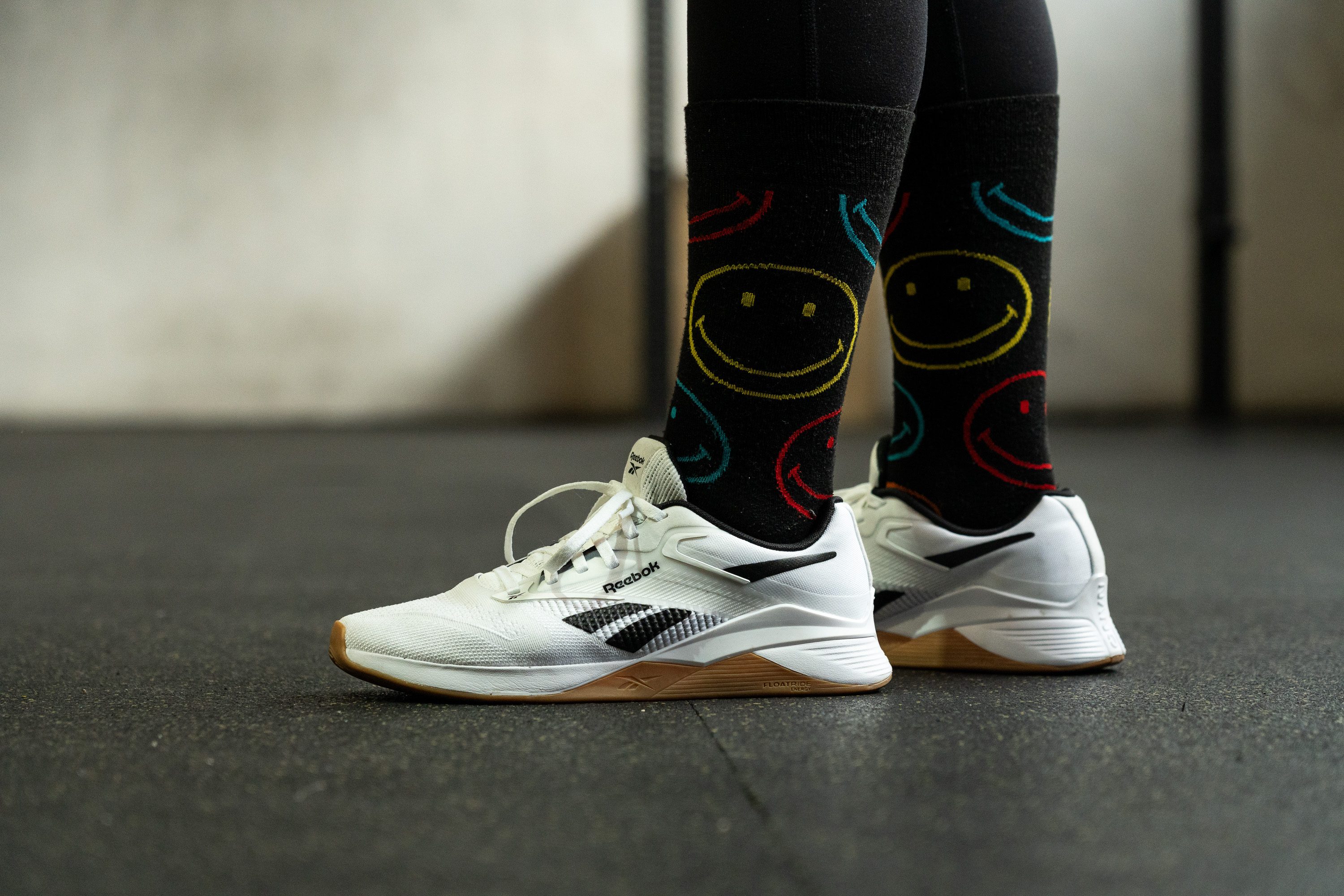
Who should NOT buy
As a well-rounded trainer, the Reebok Nano X4 doesn't excel in more niche training activities like running and heavy weightlifting. We do recommend investing in a separate pair of shoes for these activities if they take up the bulk of your training. Try the Reebok Floatride Energy 5 for running and the Reebok Legacy Lifter III for lifting.
Another reason to consider an alternative shoe is if you have wide feet and are used to having a very spacious toebox. In that case, go for the Nike Metcon 9 or the earlier X1 version of the Nano.
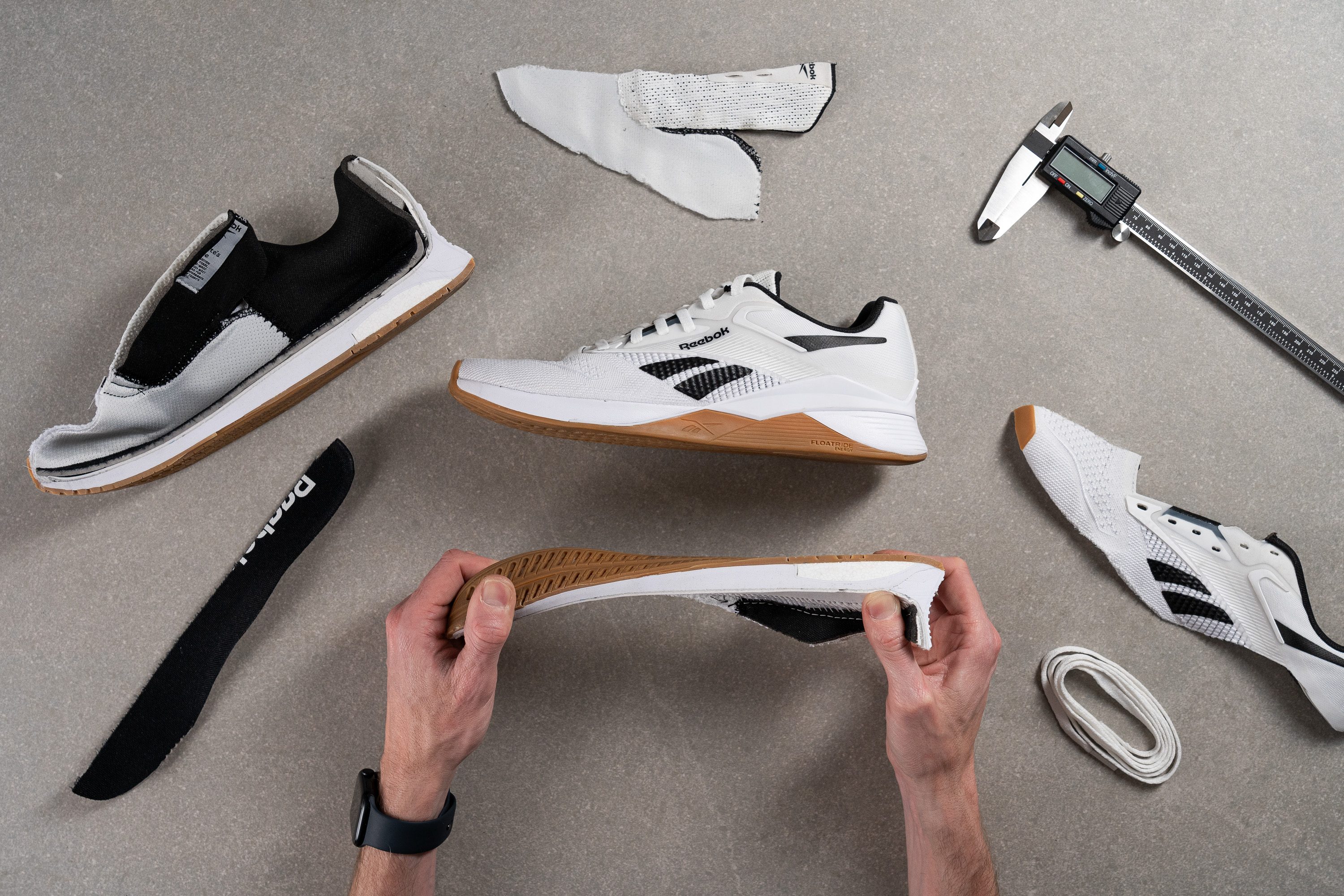
Cushioning
Shock absorption
We found the Reebok Nano X4's platform to be perfectly balanced for general fitness workouts involving both dynamic HIIT and static weightlifting.
The shoe's shock absorption measurements turned out to be right on par with the category averages at 81 SA in the heel and 66 SA in the forefoot.
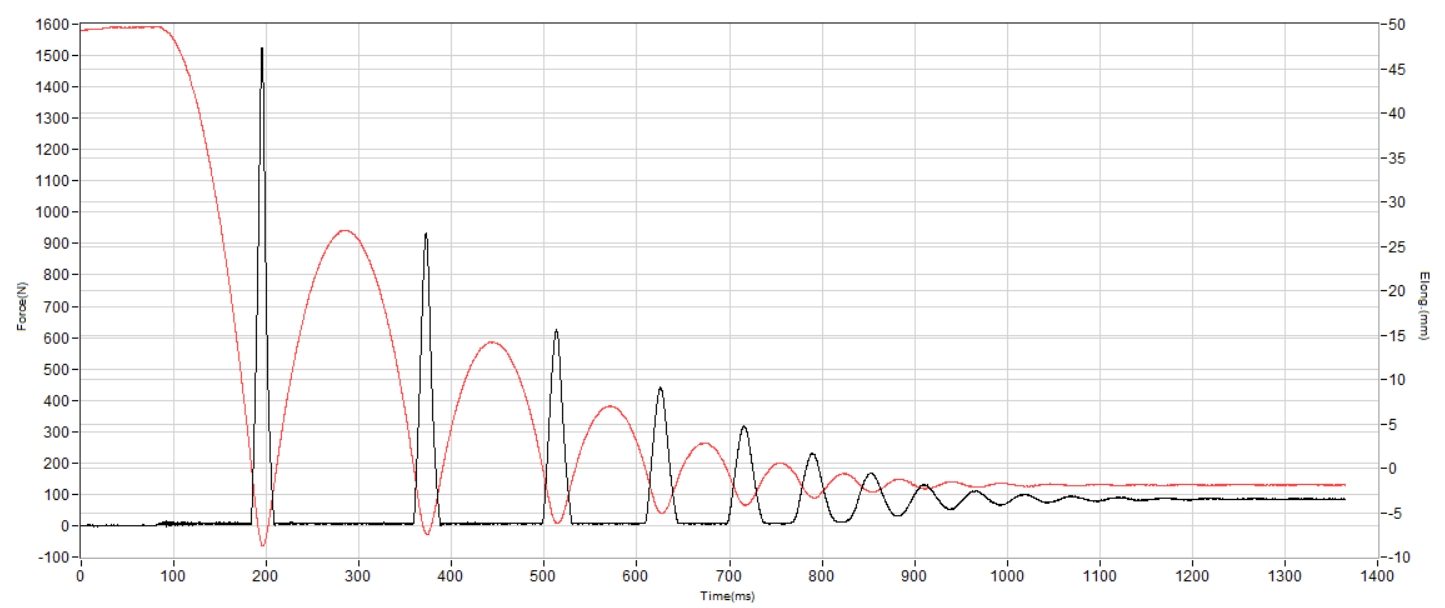
| Nano X4 | 81 SA |
| Average | 79 SA |
Energy return
There is no mushiness to the Nano X4's firm and elastic midsole.
The shoe exhibited above-average energy return readings of 61% in the heel and 58.4% in the forefoot, proving to be quite dynamic but not explosive.
| Nano X4 | 61.0% |
| Average | 54.8% |
Heel stack
The Reebok Nano X4 feels very grounded underfoot. It kept our feet close to the floor but offered just enough foam to buffer the impact of high-intensity training.
That's why we were quite surprised to see 26.0 mm as we measured the shoe's heel stack with a caliper. Based on the brand's official specs, it should be only 20 mm!
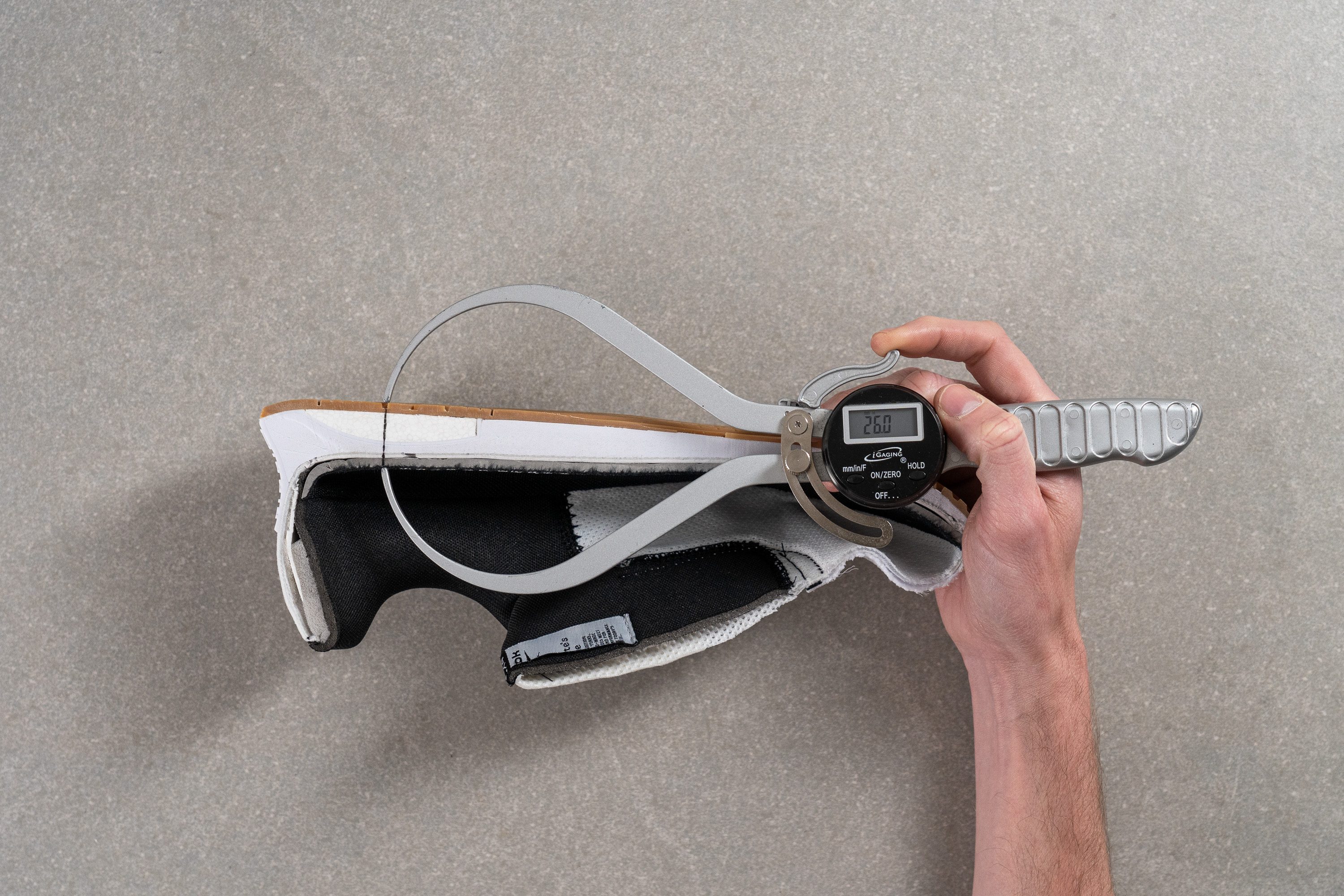
Please note that we follow the guidelines set by World Athletics to measure the stack heights on all shoes for consistency. The measurement includes the outsole, the midsole, and the insole.
| Nano X4 | 26.0 mm |
| Average | 24.3 mm |
Forefoot stack
Our forefoot stack measurement also deviates from the official specs. Showing 17.4 mm on our caliper, it is a few millimeters off the stated 13.0 mm.
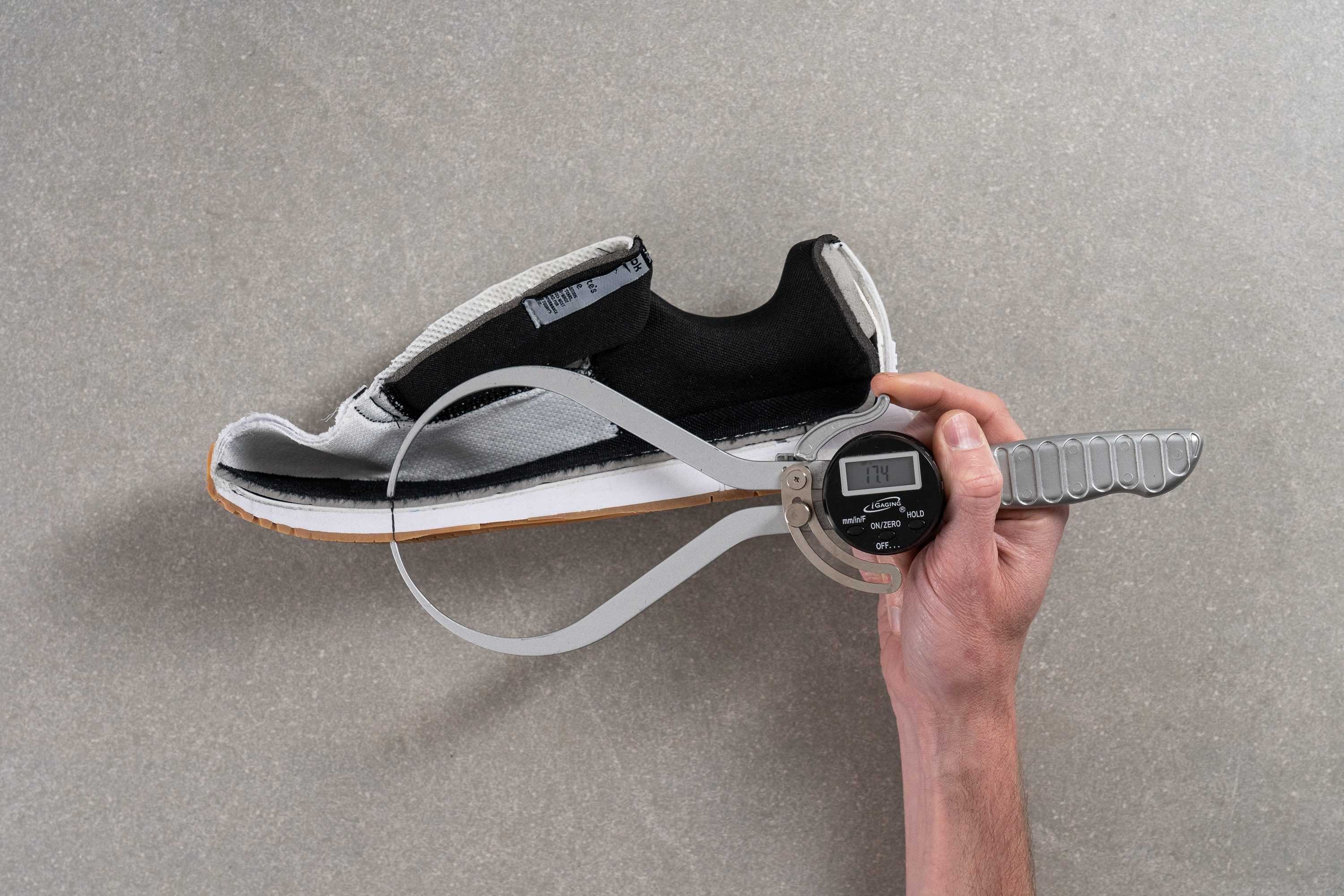
But if we talk about the on-foot experience only, the Nano X4 felt very supportive under the balls of our feet. Doing all sorts of jumps never felt like a chore and we could comfortably stay on our toes for the entire rep.
Rope jumping also felt at home in this Reebok trainer.
| Nano X4 | 17.4 mm |
| Average | 18.1 mm |
Drop
Based on our stack measurements of the Nano X4, its heel-to-toe drop turns out to be higher than the stated 7 mm. We measured it to be even taller at 8.6 mm!
It is a bit taller than the typical 4-6 mm drop of cross-training shoes but it's not necessarily a bad thing.
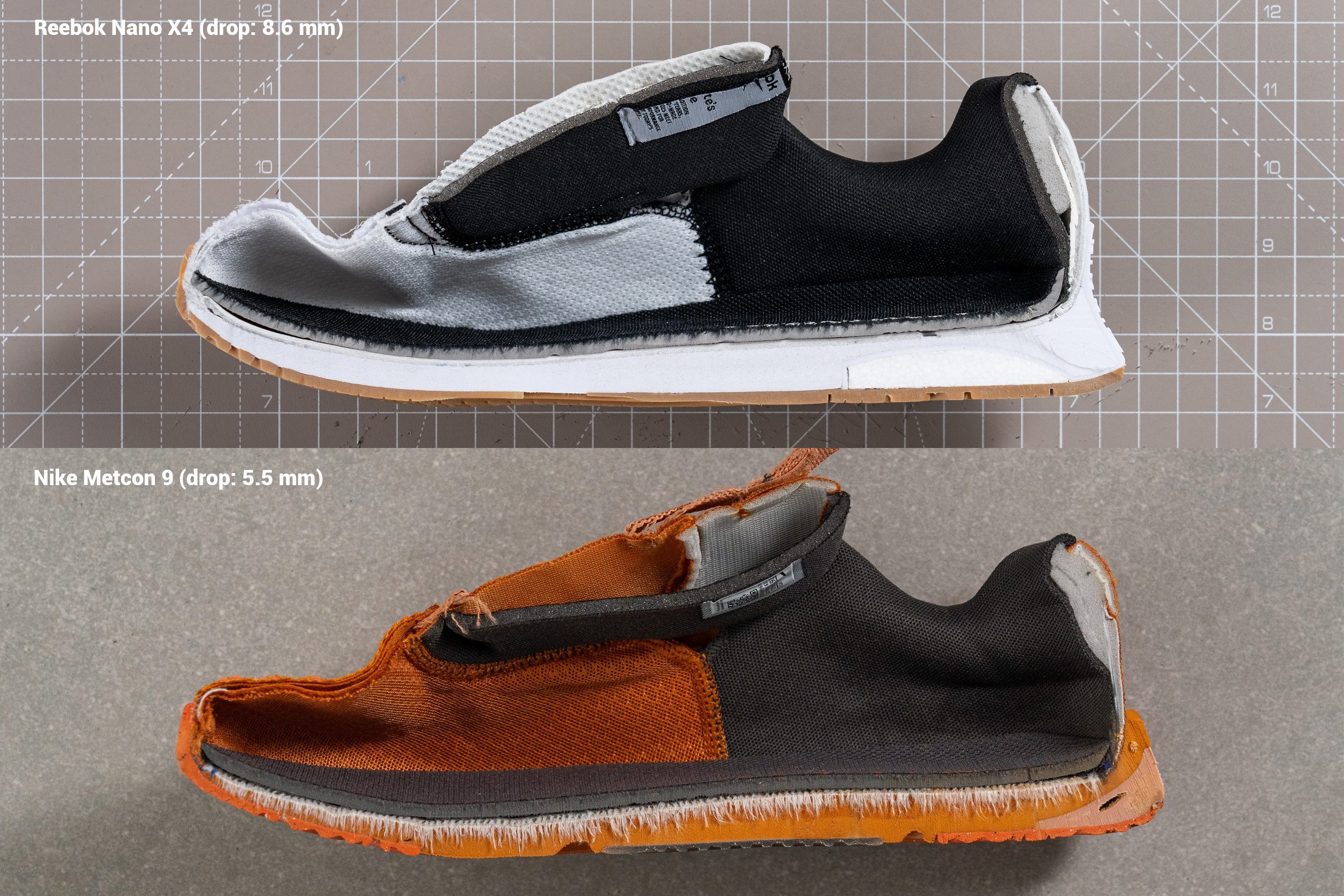
A higher drop offers the benefit of added heel cushioning and better support for the ankle. It prevents your Achilles tendon from getting too strained during the squat.
Gladly, we never felt as though the Nano X4's slightly elevated heel was pushing us forward, even when deadlifting. On foot, the shoe actually feels flatter than the caliper shows. Pretty similar to the Metcon 9.
| Nano X4 | 8.6 mm |
| Average | 6.3 mm |
Midsole softness
The main portion of the Nano X4's midsole is made of a fairly standard foam that seems to be EVA-based. It felt firm and not readily compressible, especially during the break-in period.
Pressing our durometer against it returned a reading of 30.0 HA. It is a typical hardness for a cross-trainer and is notably firmer than a regular running shoe. To be more specific, the Reebok Nano X4 is 40% firmer than the average running shoe.
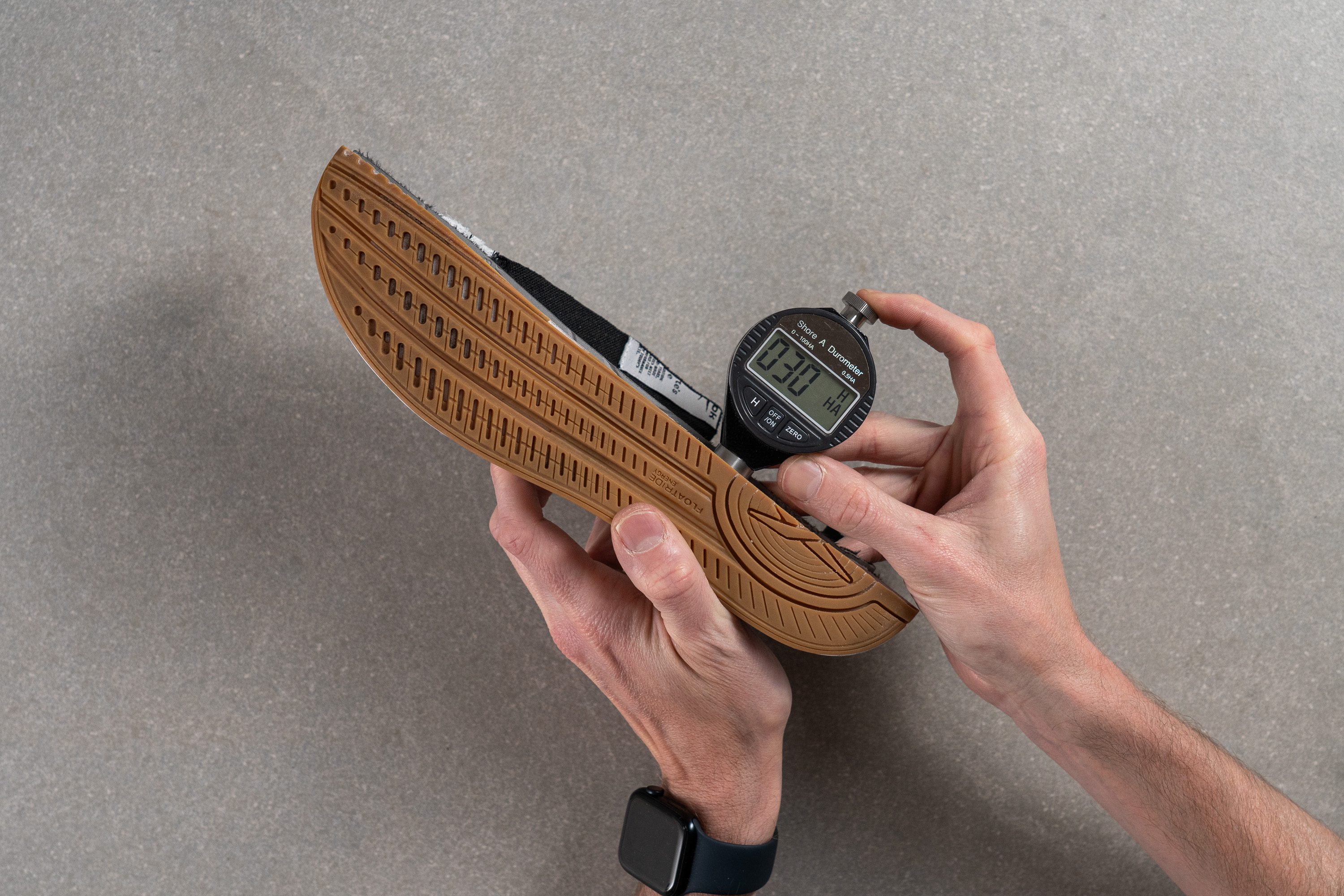
Let's not forget that the hard rubber caging around the shoe's midsole also makes the Nano X4 feel much harder than what the durometer shows.
All of it makes this Reebok trainer less than ideal for running sessions but it could work for a quick warm-up run up to 1 mile.
| Nano X4 | 30.0 HA |
| Average | 27.8 HA |
Secondary foam softness
What makes the Nano X4 a little less arduous for running is the use of the Floatride Energy Foam under the heel.
This compound is even visually different from the primary foam as it takes the shape of tiny rounded pellets squeezed together (sort of like Adidas Boost). Based on our durometer measurement (27.0 HA), it is also a little softer than the rest of the midsole (by 11%).
We were happy with how the Floatride added a touch of impact protection upon landings. We found it especially helpful during box jumps.
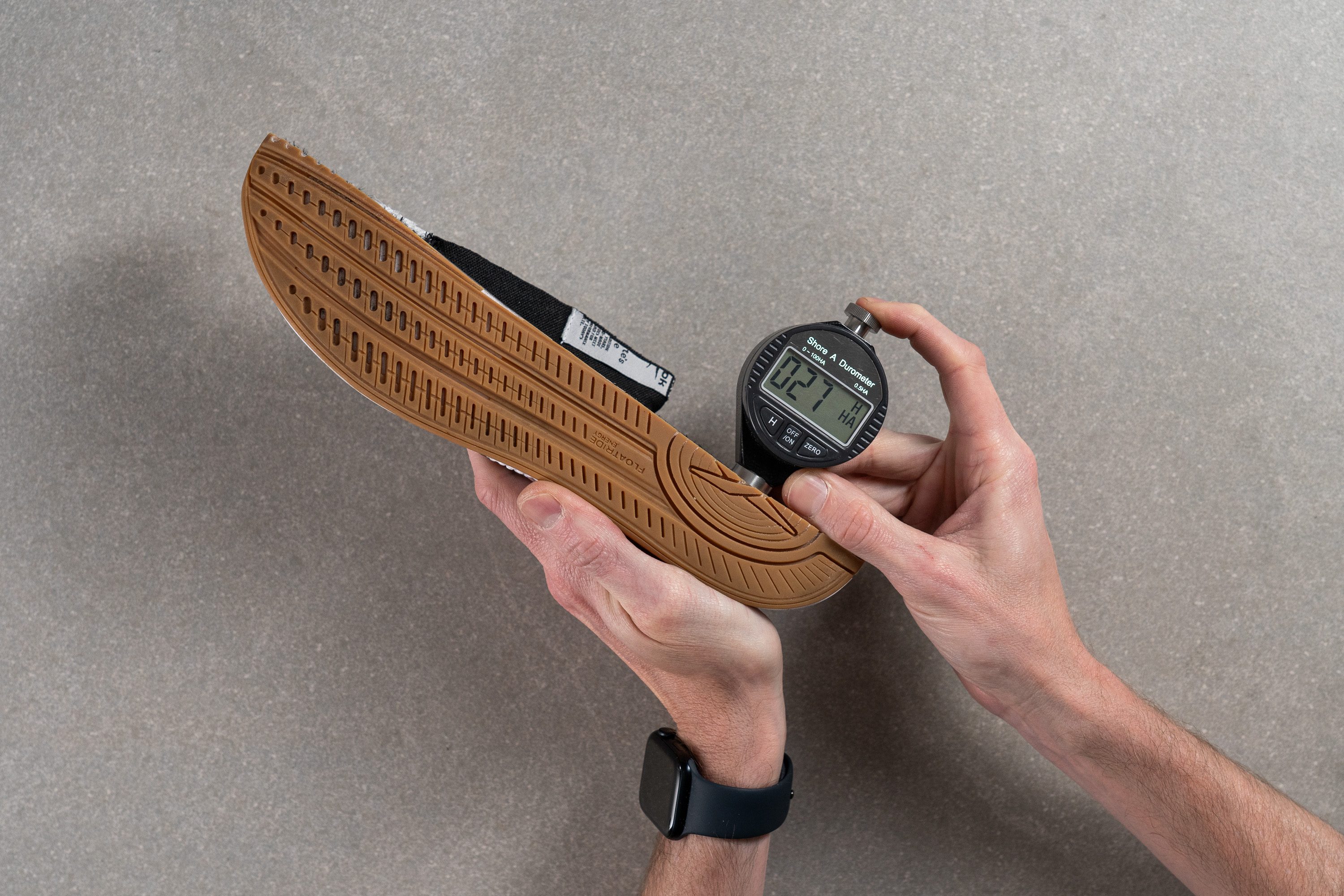
| Nano X4 | 27.0 HA |
| Average | 35.1 HA |
Size and fit
Size
Reebok Nano X4 fits slightly small (62 votes).
Internal length
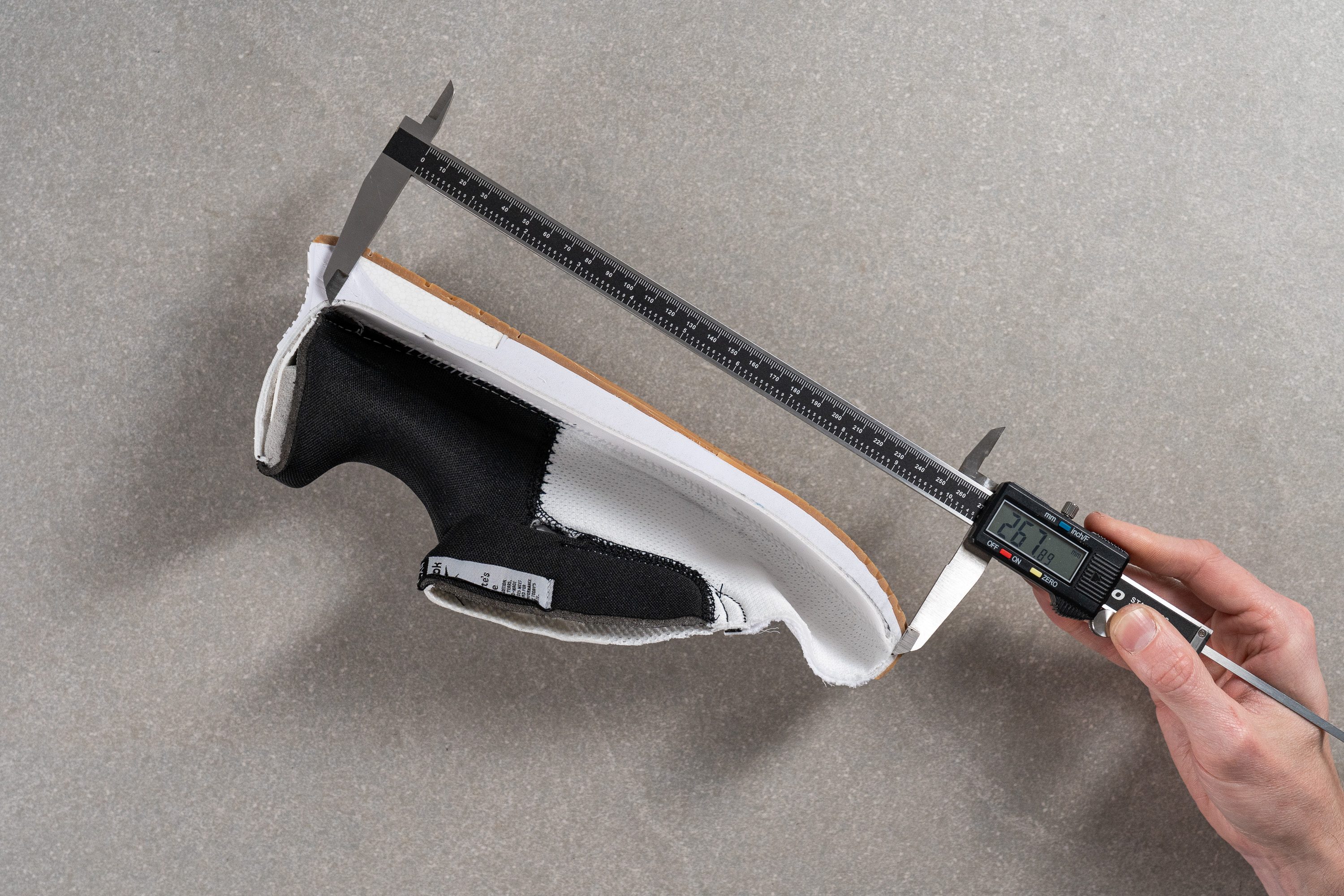
| Nano X4 | 267.9 mm |
| Average | 268.9 mm |
Toebox width - widest part
However, we can see why some people have gripes with the fit of the Reebok Nano X4. Its toebox is not as spacious as in the Metcon and some other popular cross-trainers.
Because it is a unisex shoe, it caters to both genders sacrificing the roominess for wide-footed folks.
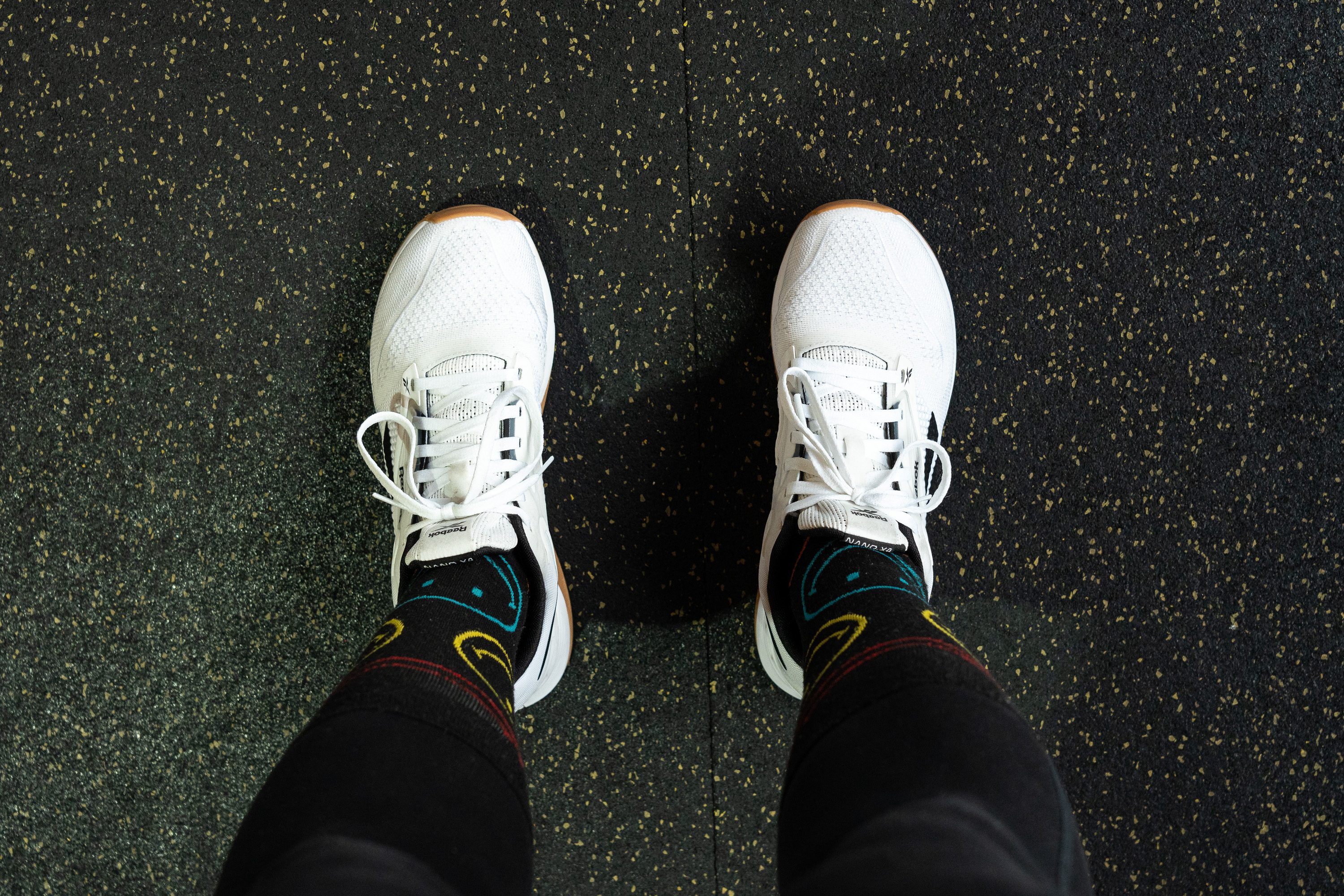
But don't worry, our personal experience and caliper measurements show that the Nano X4 offers a well-fitting medium width.
In the widest part of the shoe's toebox, the tool showed 99.4 mm which is just the same as the average. But sure, it's not as wide as the Metcon 9 (108.0 mm).
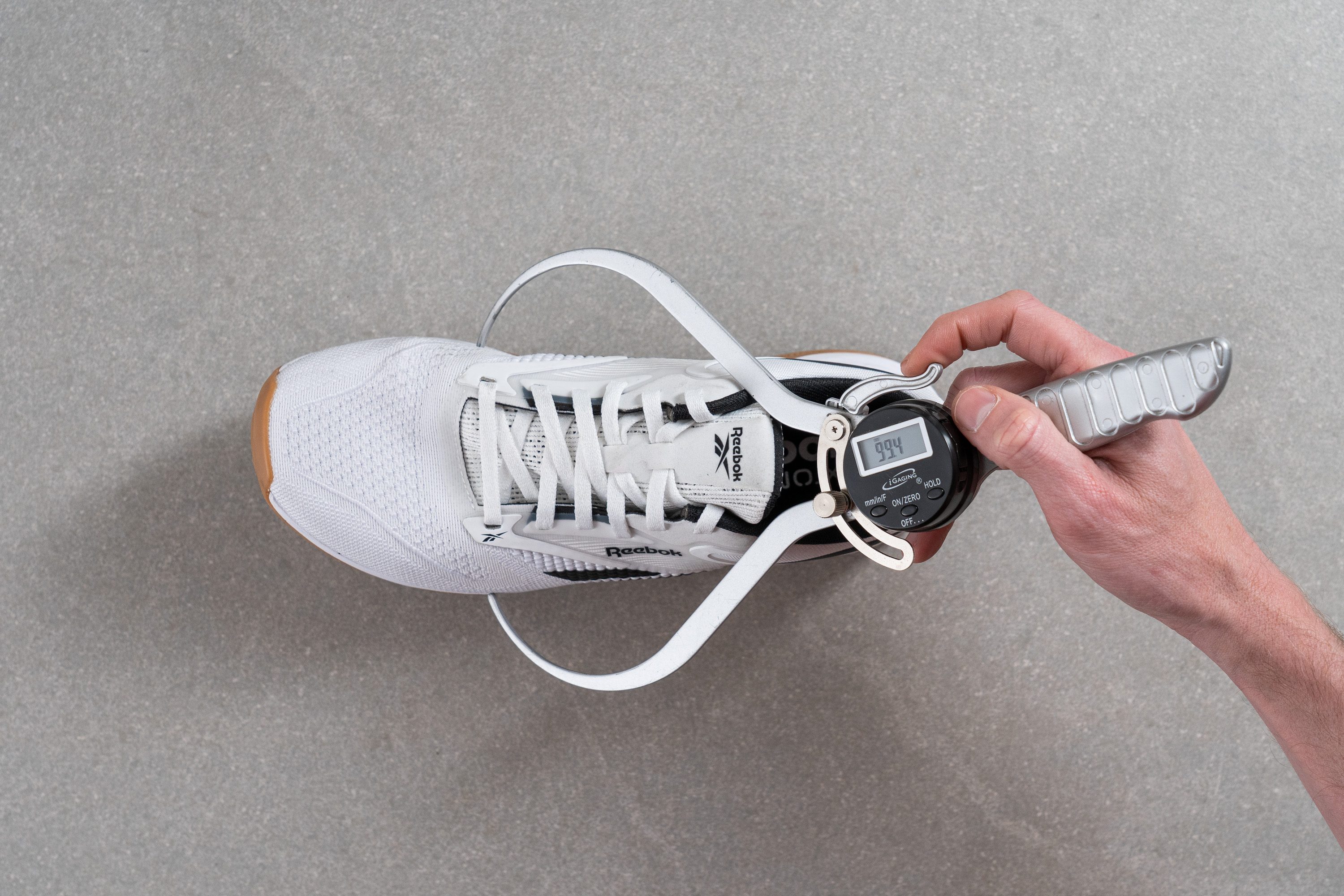
This test follows an older methodology, which is why you don't see recently tested shoes in the chart. Results from different methodologies can not be compared.
| Nano X4 | 99.4 mm |
| Average | 100.6 mm |
Toebox width - big toe
The toebox tapering is not very aggressive in the Nano X4 either. In the big toe area, our caliper showed a standard 81.2 mm.
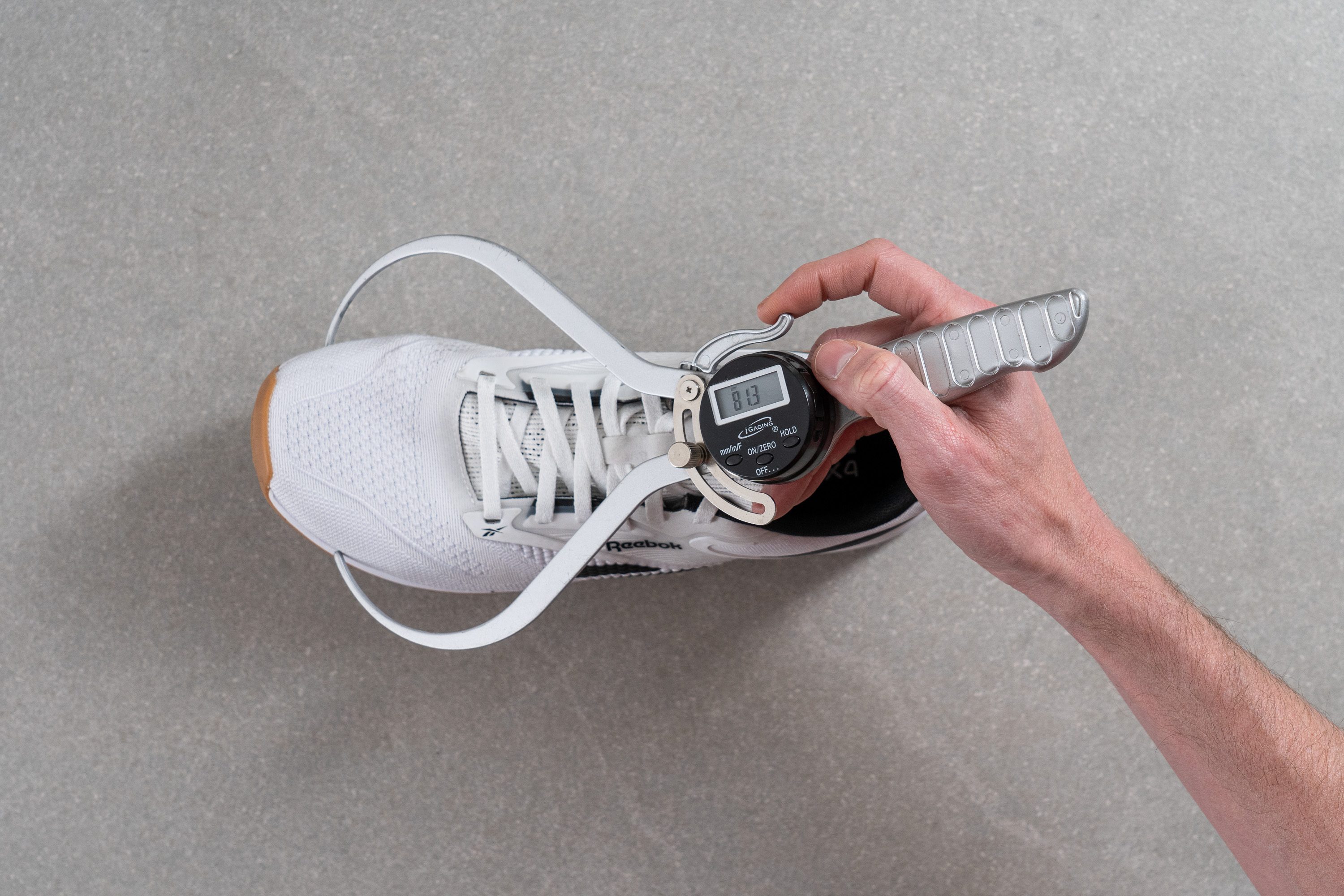
As we said, this is a good amount of space for a medium-width foot. But if you have very wide feet, it's better to consider the Metcon instead.
We also wouldn't hope that the shoe's knit upper stretches out with use because it doesn't seem to have any give.
This test follows an older methodology, which is why you don't see recently tested shoes in the chart. Results from different methodologies can not be compared.
| Nano X4 | 81.3 mm |
| Average | 78.8 mm |
Traction / Grip
Traction test
With a solid coefficient of friction in the forefoot (0.33), this Reebok trainer provides good grip and stopping power on any gym flooring. It even maintains traction on dusty and sweaty gym mats as well as plywood lifting platforms and plyo boxes. The shoe's hollowed-out treads work as suction cups on smooth surfaces, contributing to the grip.
| Nano X4 | 0.33 |
| Average | 0.33 |
Outsole design
The Nano X4's recessed treads are made larger in the forefoot to enhance grip but get thinner and practically non-existent in the heel to create a smoother surface for better contact with the floor.
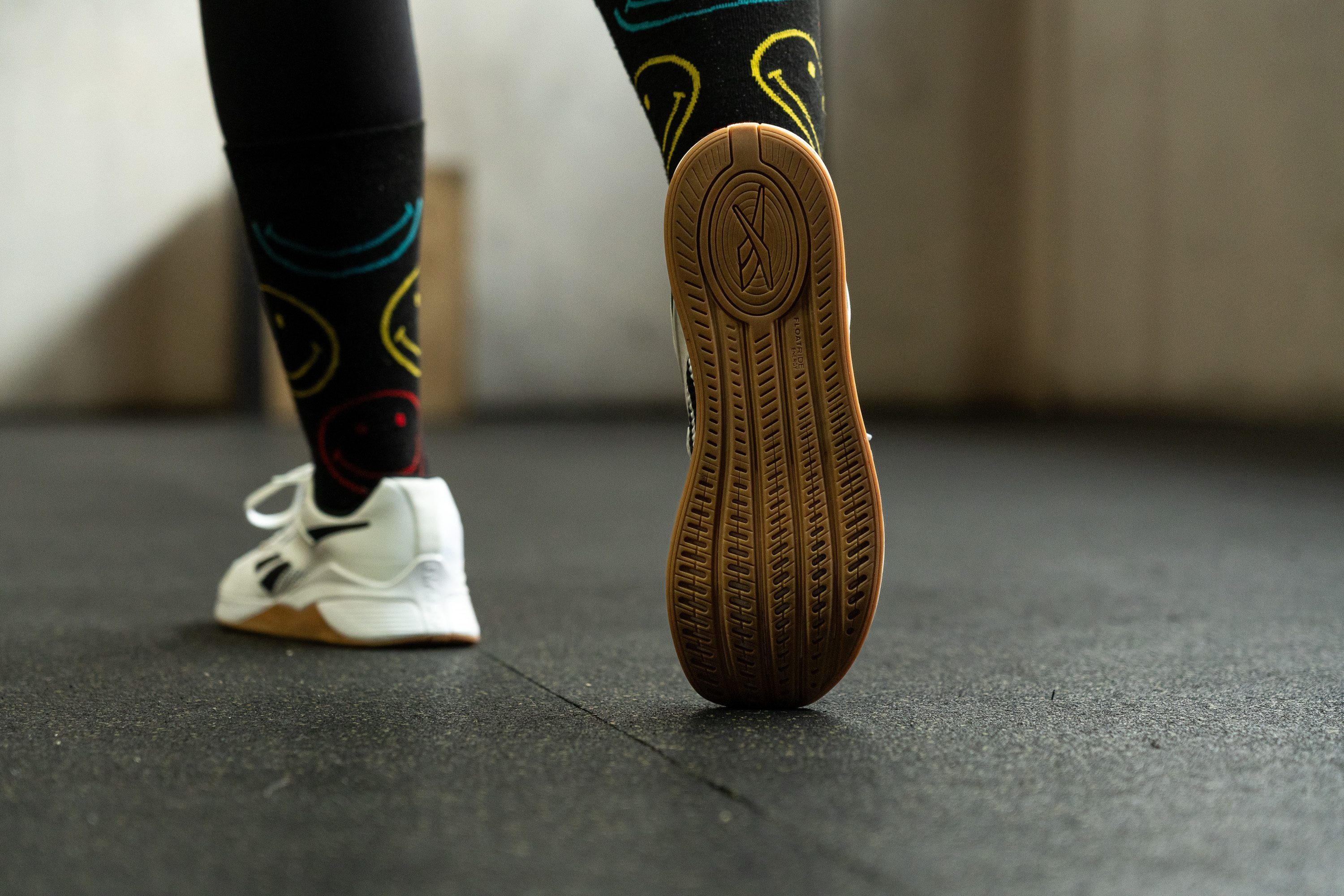
Flexibility / Stiffness
The seemingly robust construction of the Nano X4 still has enough give to bend in the forefoot. Going into lunges, burpees, and planks felt seamless thanks to the shoe's flexibility.
To put this Reebok trainer side-by-side with other shoes, we measured how much force it takes to bend it to a 30-degree angle. According to our flexibility testing machine, the Nano X4 required almost as much force as the average training shoe - 11.8N.
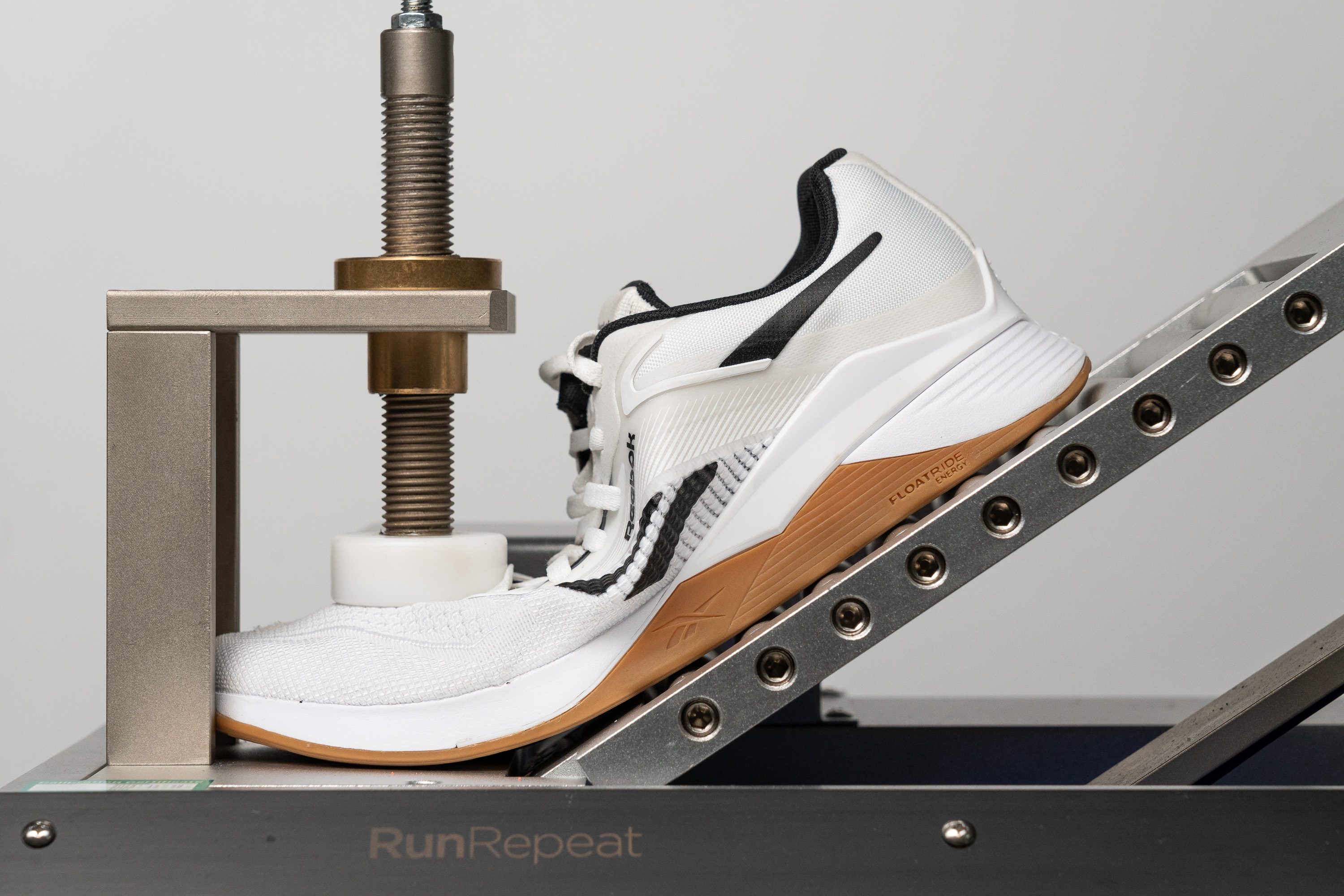
| Nano X4 | 11.8N |
| Average | 10.2N |
Weight
The biggest and most tangible update of the Reebok Nano X4 is the shoe's significant weight reduction!
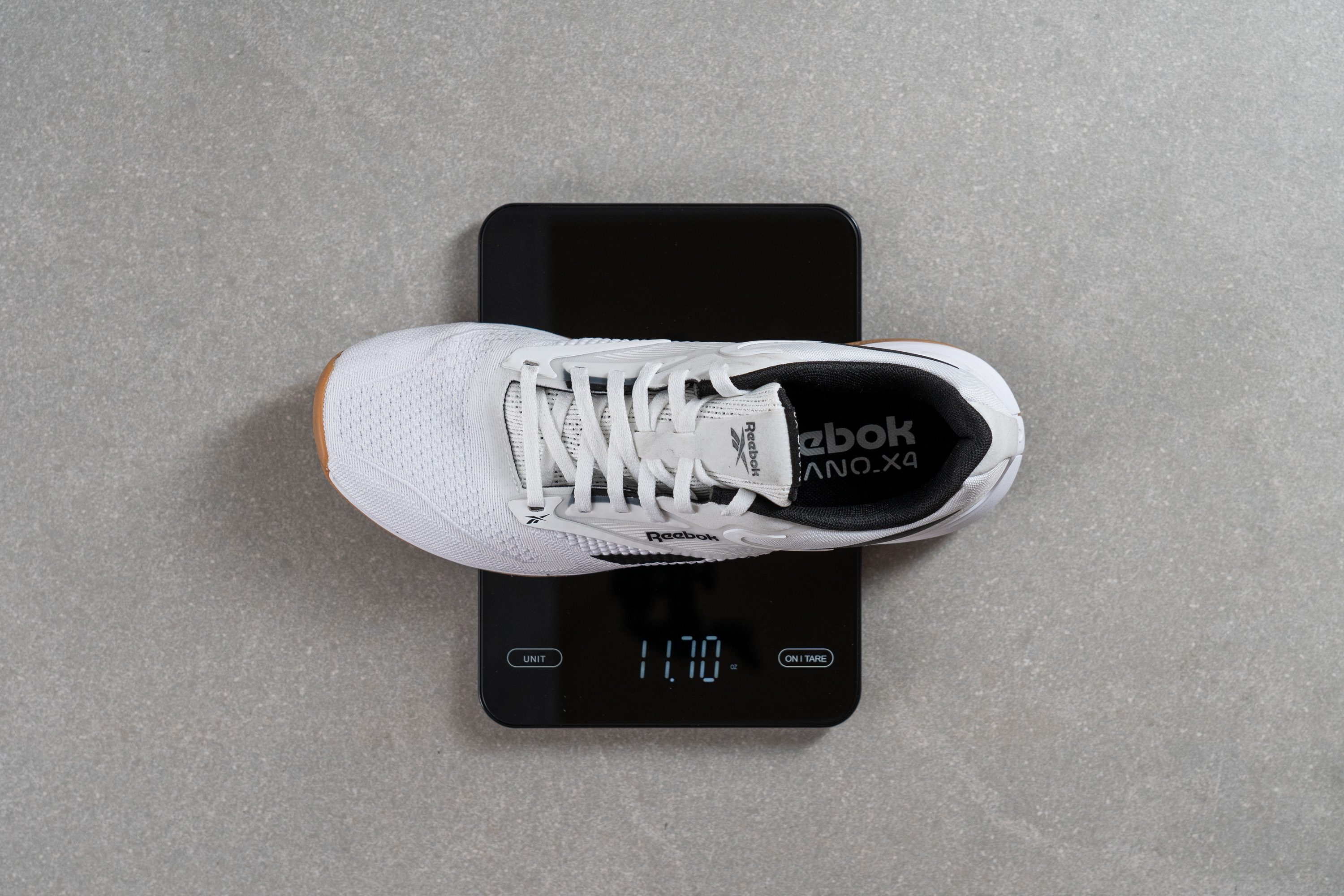
Weighing it in a men's US size 9, we were elated to see a number below 12 oz. The Nano X4 tips the scale at only 11.7 oz (322.0g)! The preceding Nano X3 came in at 12.4 oz (352g).
Comparing the two Nanos, it's hard to tell exactly what helped the newer iteration lose weight. Perhaps it is due to less TPU around the heel?
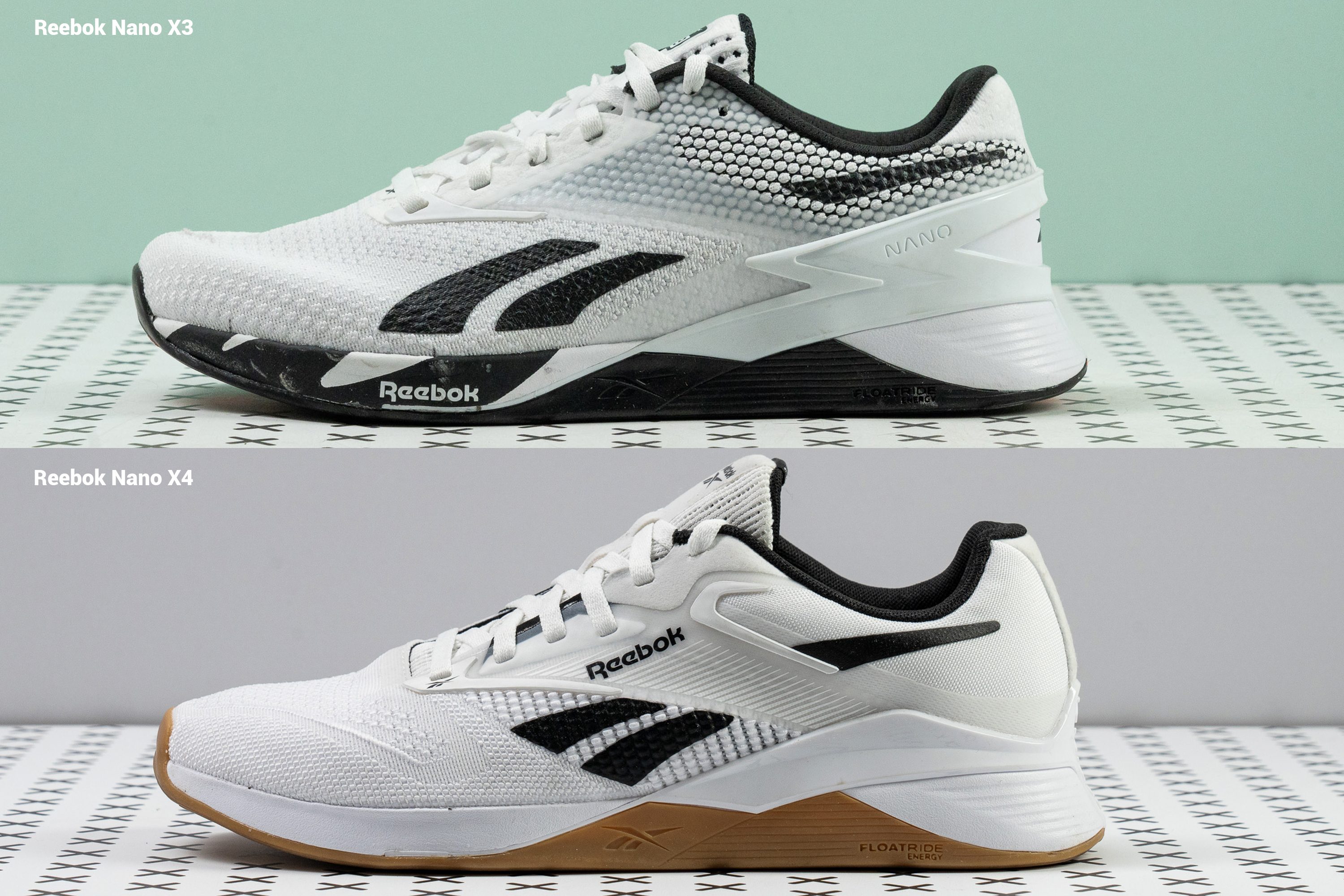
For a cross-training shoe of its kind, the Nano X4 feels pleasantly light on foot. For reference, the Nike Metcon 9 weighs 13.4 oz (378g) in the same size.
| Nano X4 | 11.7 oz (332g) |
| Average | 10.7 oz (304g) |
Breathability
Reebok claims the Nano X4 to be one of the most breathable Nano iterations yet for a good reason. Even though we wouldn't call it a highly breathable trainer, we found it ventilated enough to cool our sweaty feet down during the workout.
We attribute the shoe's airflow to the ventilation panels on the sides of the upper. They played a key part in letting the heat escape from the upper and earned the Nano X4 a high breathability score (4 out of 5).
But if we're talking THE most breathable trainer yet, no shoe is better ventilated than the Adidas Dropset 2! Even the sole of that shoe is perforated for better airflow.
| Nano X4 | 4 |
| Average | 3.6 |
Stability
Lateral stability test
As a premium-class cross-trainer, the Reebok Nano X4 never disappointed us in the stability department.
We experienced excellent side-to-side containment during both static and dynamic exercises. This is in part thanks to the brand's proprietary Lift and Run Chassis which embraces the rear side of the trainer.
Curiously, it didn't get in the way of cushioning but prevented the sole from compressing when we had to plant our feet during the lifting bouts.
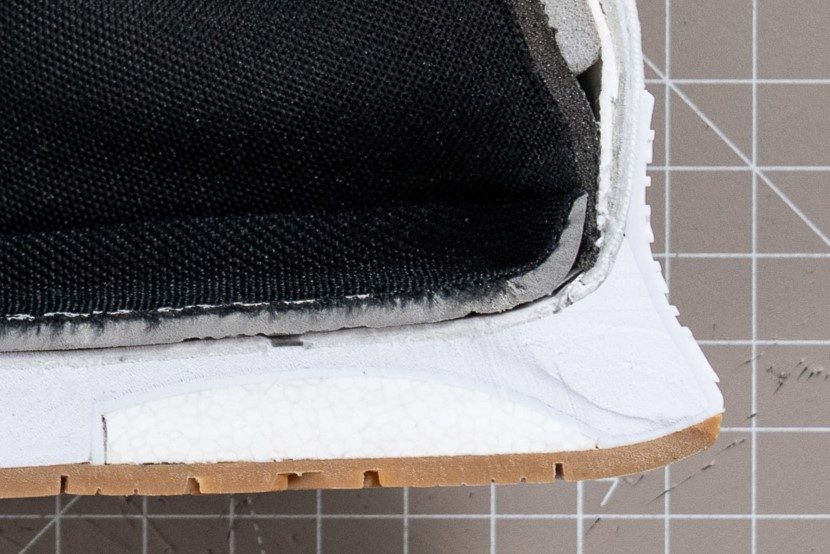
The only scenario in which the Nano X4's stability would not suffice, in our opinion, is heavy Olympic lifting. If you need a dedicated trainer to regularly lift over 300 lbs (135 kg) in squats and over 450 lbs (205 kg) in deadlifts, we recommend investing in the Reebok Legacy Lifter III.
Torsional rigidity
The Nano X4 did an excellent job keeping us surefooted and never once came close to buckling. There is a ton of structure to this cross-training shoe.
Trying to twist it in our manual test, we had to put in a great deal of force. We confidently rated its torsional rigidity as 4 out of 5 (where 5 is the stiffest).
| Nano X4 | 4 |
| Average | 2.9 |
Heel counter stiffness
Our heels and ankles were securely locked in place inside the Reebok Nano X4. Its sturdy TPU heel clip paired with a rather dense collar padding offered a very firm hold at the back of the shoe.
Assessing the shoe's heel counter stiffness in a manual test, we gave it a high score of 4 out of 5.
As long as you get the right size in the Reebok Nano X4, you are guaranteed no shifting or slipping of the heel.
| Nano X4 | 4 |
| Average | 2.7 |
Midsole width - forefoot
The Reebok Nano X4 has a reasonably wide base that doesn't feel bulky at all.
Measuring it in the widest part of the forefoot, our caliper showed 106.5 mm. It is not as wide as some cross-trainers can get, but we found it sufficiently wide to keep us planted the entire workout.
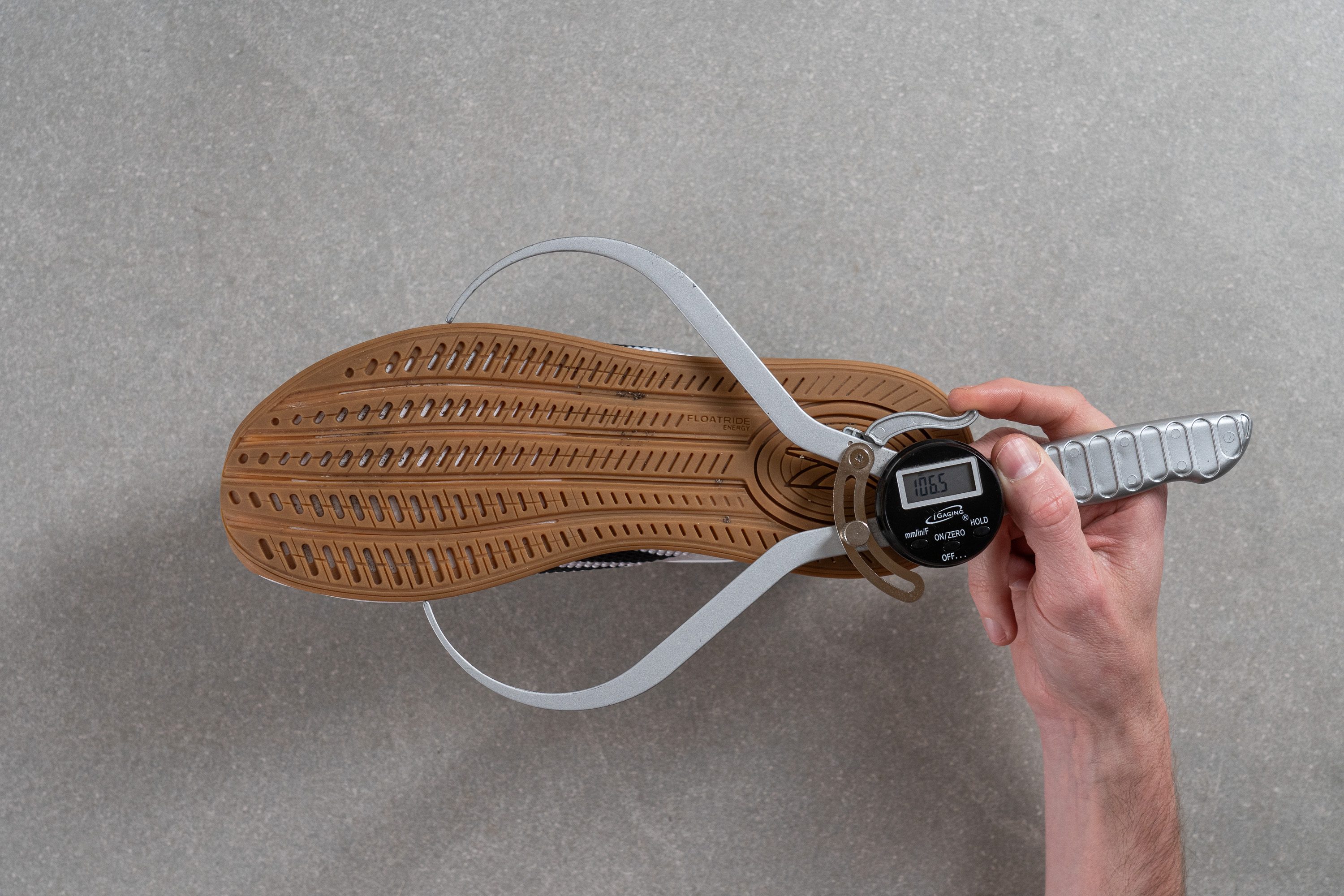
| Nano X4 | 106.5 mm |
| Average | 110.9 mm |
Midsole width - heel
In the widest part of the shoe's heel, we also got a moderate reading of 85.1 mm.
It gives the Nano X4 a more streamlined look than the Metcon 9 (95.0 mm!) without detracting from stability.
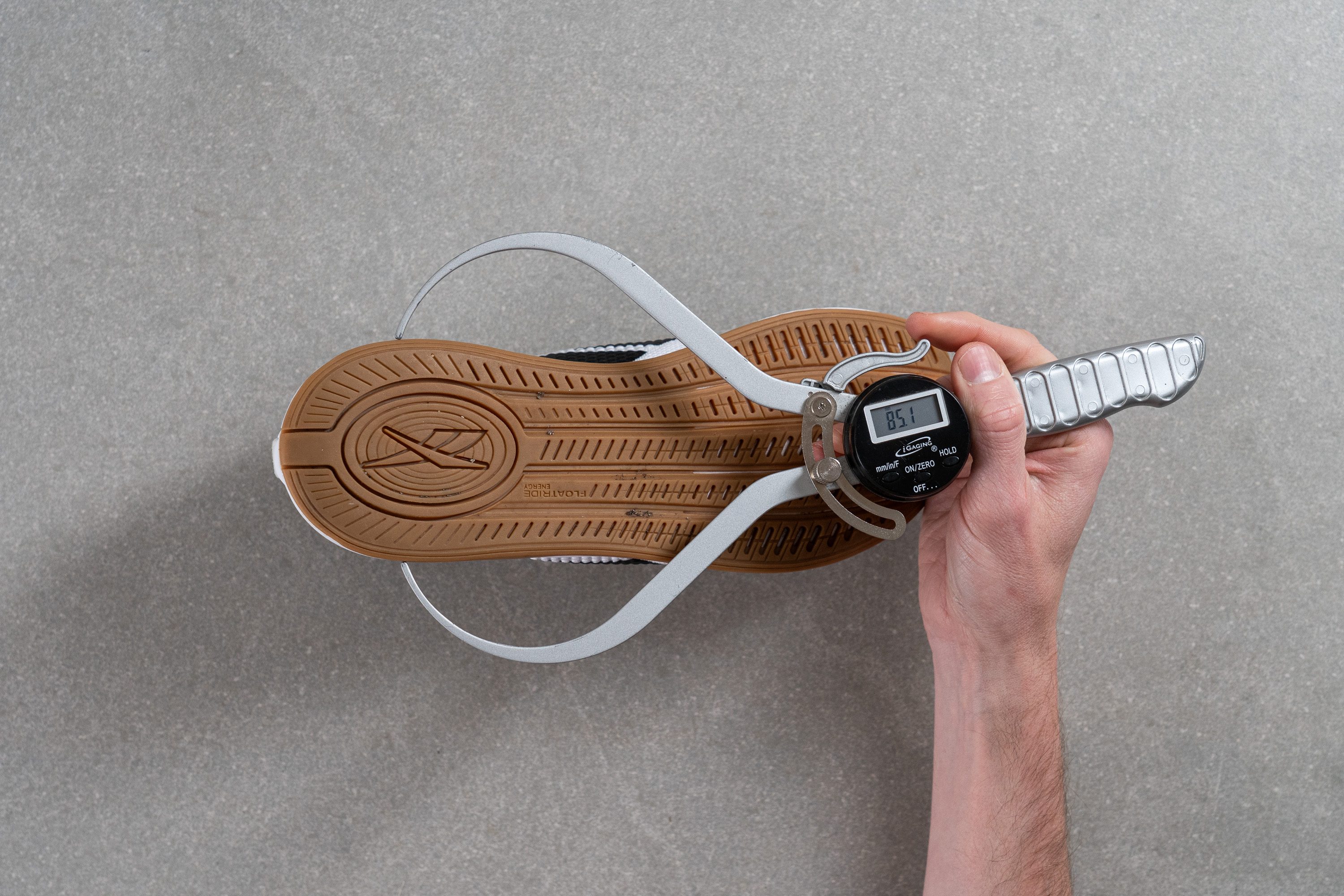
| Nano X4 | 85.1 mm |
| Average | 86.9 mm |
Durability
Toebox durability
In its quest for perfection, Reebok keeps updating the Flexweave in every iteration of the Reebok Nano. Even though we had no complaints about the wear resistance of the past models, we applaud the brand for keeping its quality standards high.
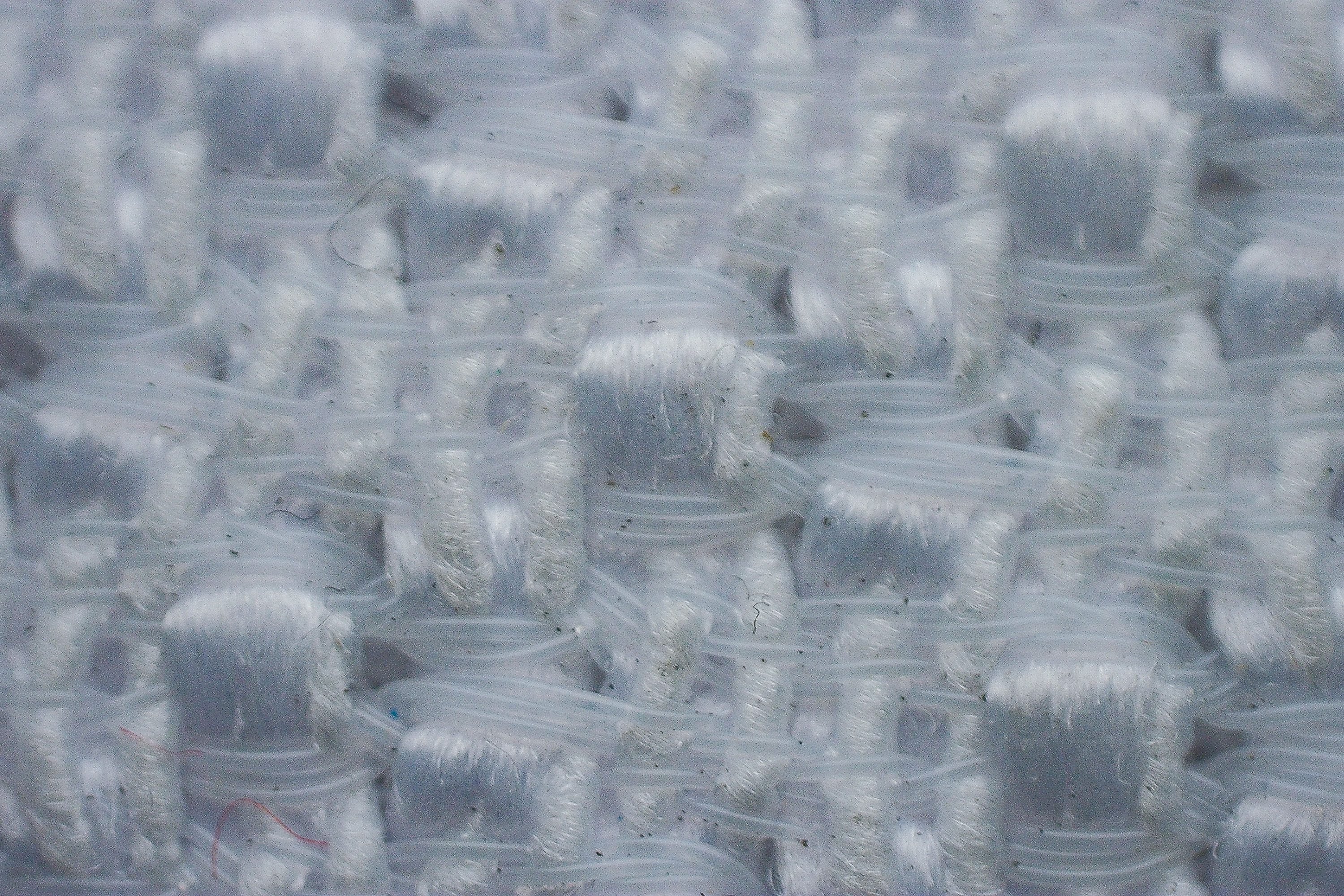
The video above shows our attempt to put a hole in the shoe's toebox with a Dremel. The speed is set to 5K RPM and the pressure remains consistent at 3.2N. But even 12 seconds of applying sandpaper failed to damage the Flexweave!
With a minor scuff only, this Reebok shoe earns a solid 4 out of 5 for toebox durability.
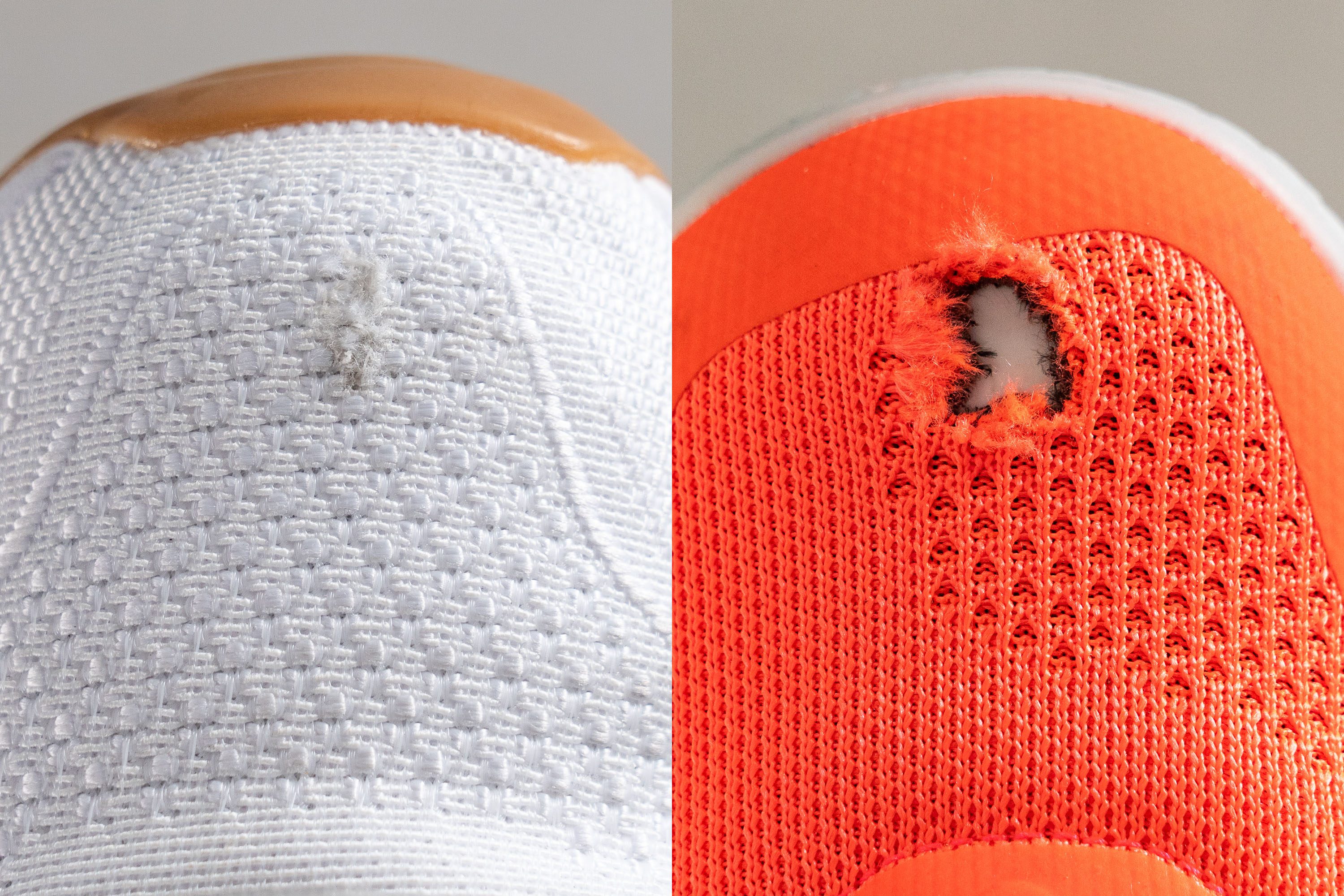
The Nano X4 shows tremendous upper durability compared to trainers with regular mesh uppers. It is not afraid of constant toe slashing, foot-dragging, and bumping into gym equipment.
| Nano X4 | 4 |
| Average | 2.7 |
Heel padding durability
Constant friction, heel bone deformity, and careless on-and-off can take a toll on the inner lining of your training shoes.
But as our lab test shows, the in-shoe textile of the Nano X4 is more immune to these hazards than other shoes!
Once again, we used a Dremel with a sandpaper tip to expose the shoe's heel lining to as much friction as possible within 4 seconds. The speed was set to the aggressive 5K RPM and the pressure stayed the same (3.2N).
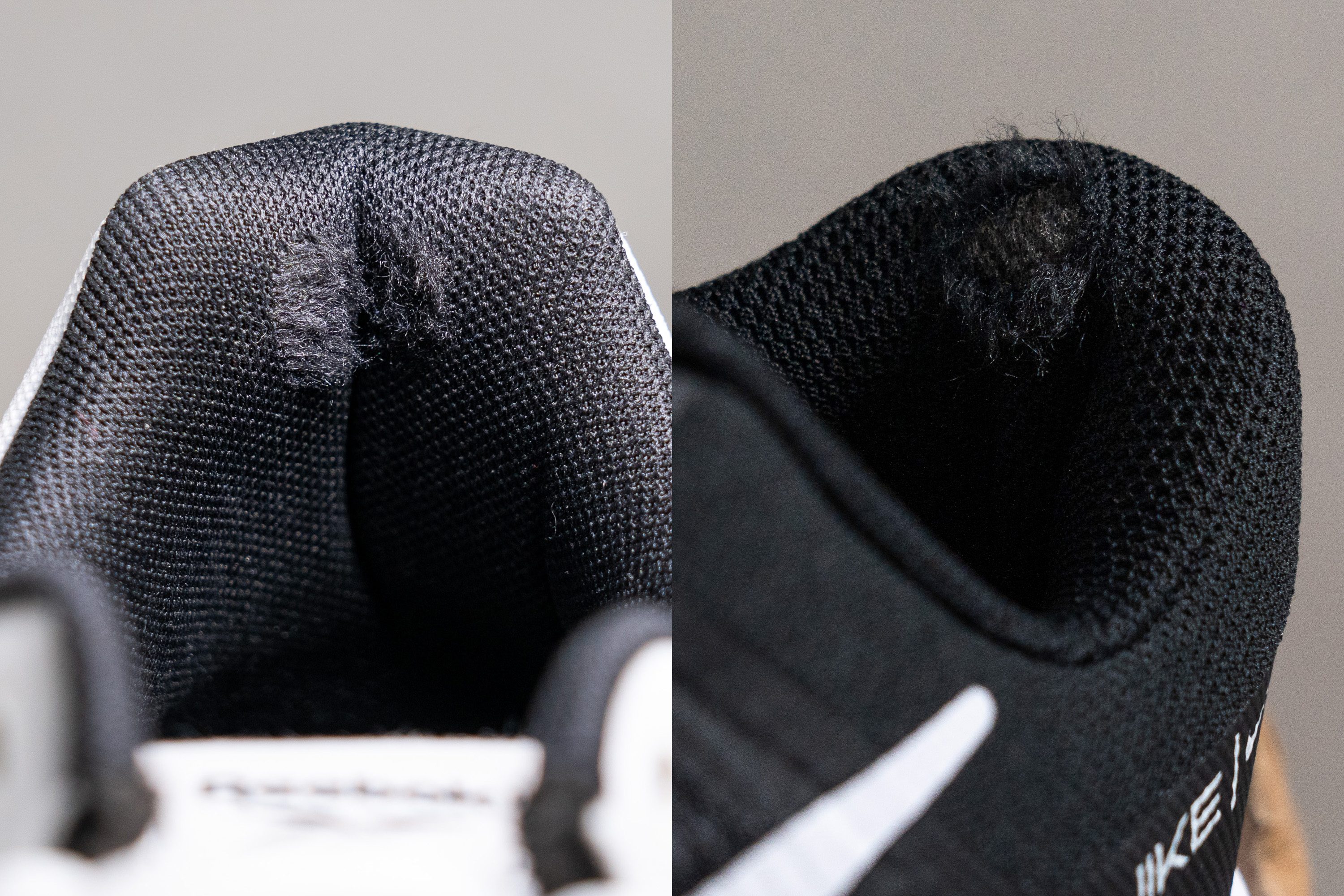
Because the shoe's lining got away with cosmetic wear only, we rated its durability with a high score of 4 out of 5.
| Nano X4 | 4 |
| Average | 2.9 |
Outsole hardness
Never once were we disappointed in the outsole durability of the Reebok Nano shoes. It is normally the last part of the shoe to give up (if it gives up at all).
We were glad to find that the Nano X4's outsole was just as hard as its predecessors. Pressing our durometer against the rubber showed 83.9 HC which is on par with other sturdy cross-trainers as well.
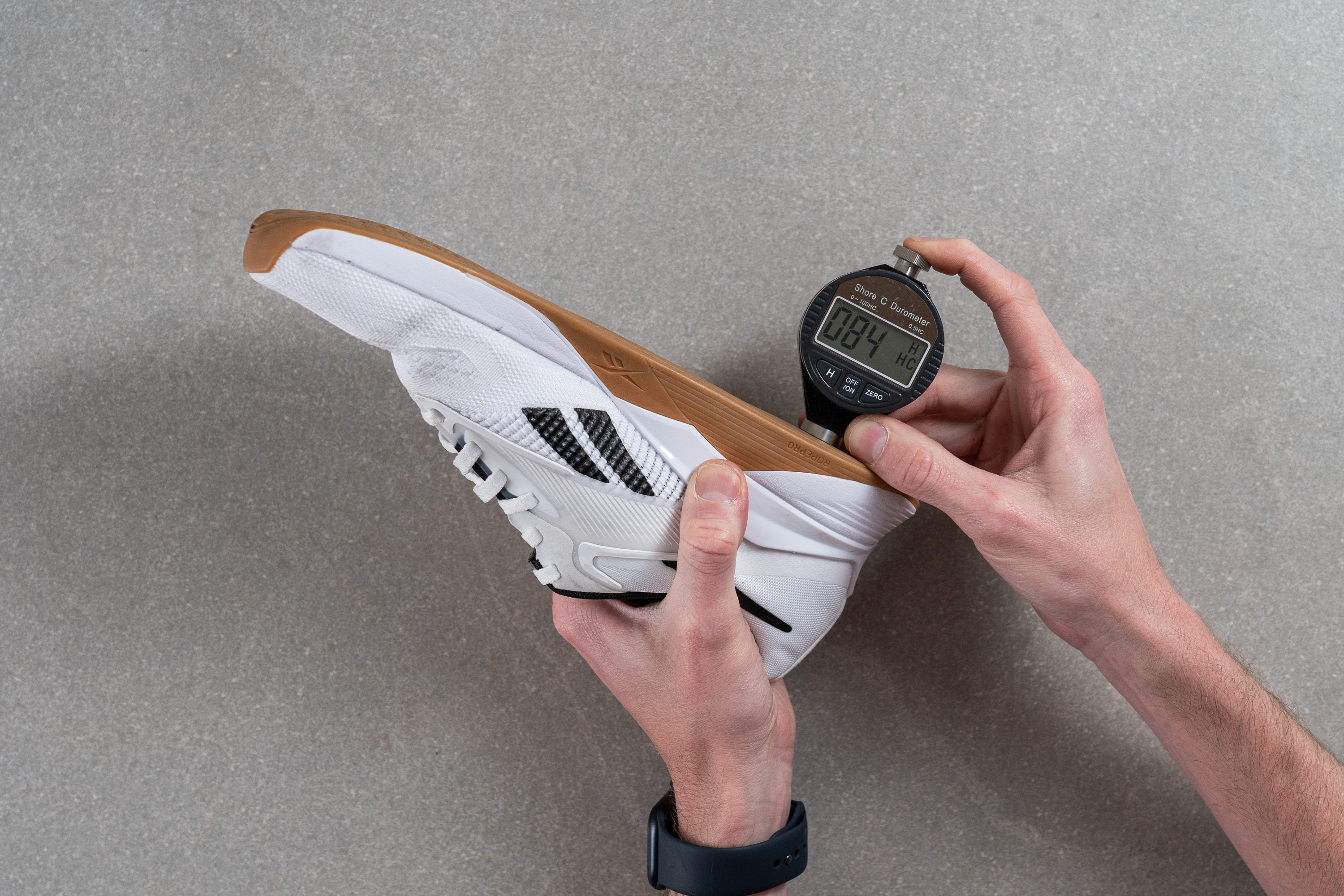
| Nano X4 | 83.9 HC |
| Average | 83.2 HC |
Outsole durability
Of course, we couldn't resist digging into the shoe with our Dremel once again. But this time, the speed was set to the relentless 10K RPM and the exposure lasted for 22 seconds.
Just as we expected from a range-topping shoe, the Nano X4 resisted the abrasion gloriously. Measuring the depth of the damage precisely with a tread gauge, we got as little as 0.5 mm!
Not only is it 50% shallower than average but it also undercuts the Nano's main rival, the Nike Metcon 9, which developed a slightly deeper dent (0.93 mm).
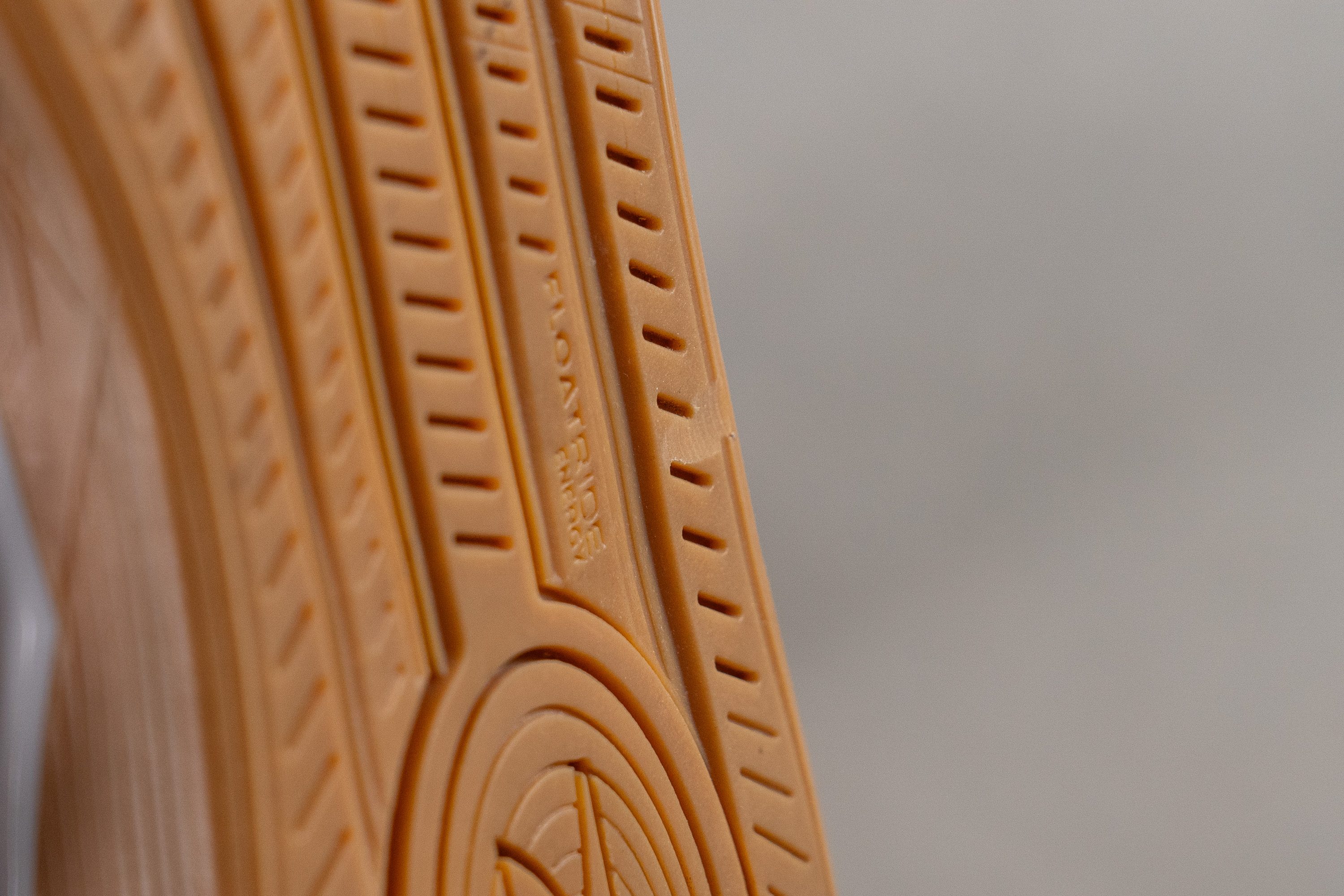
So even if you choose to do some exercises on concrete, the Reebok Nano X4 can handle that much better than other trainers.
But if you primarily train outdoors or mix training with some trail runs and hikes, you will appreciate the Reebok Nano Adventure trainer much more.
| Nano X4 | 0.5 mm |
| Average | 1.1 mm |
Outsole thickness
The amount of rubber on the Nano X4 also looks promising for the shoe's longevity.
Measuring it with a caliper, we got 3.9 mm which is the average outsole thickness among cross-training shoes.
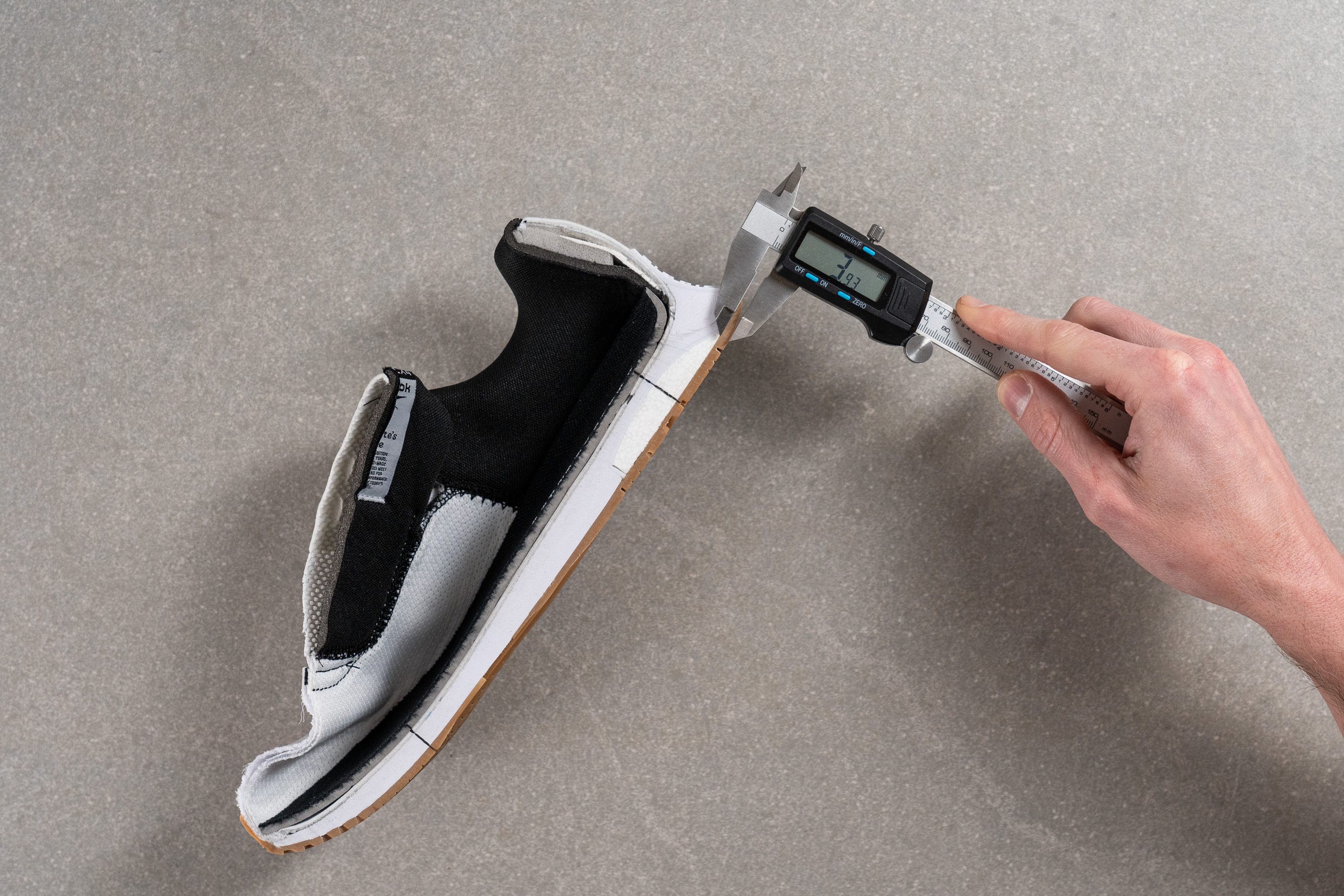
| Nano X4 | 3.9 mm |
| Average | 3.6 mm |
Misc
Insole thickness
A padded insole came in very handy to mute out the hardness of the Reebok Nano X4's platform. Measuring its thickness in the heel, or caliper showed 4.1 mm which is about the same as the average.
It even makes the shoe comfortable enough for a few hours of walking and standing. Very coach-friendly.
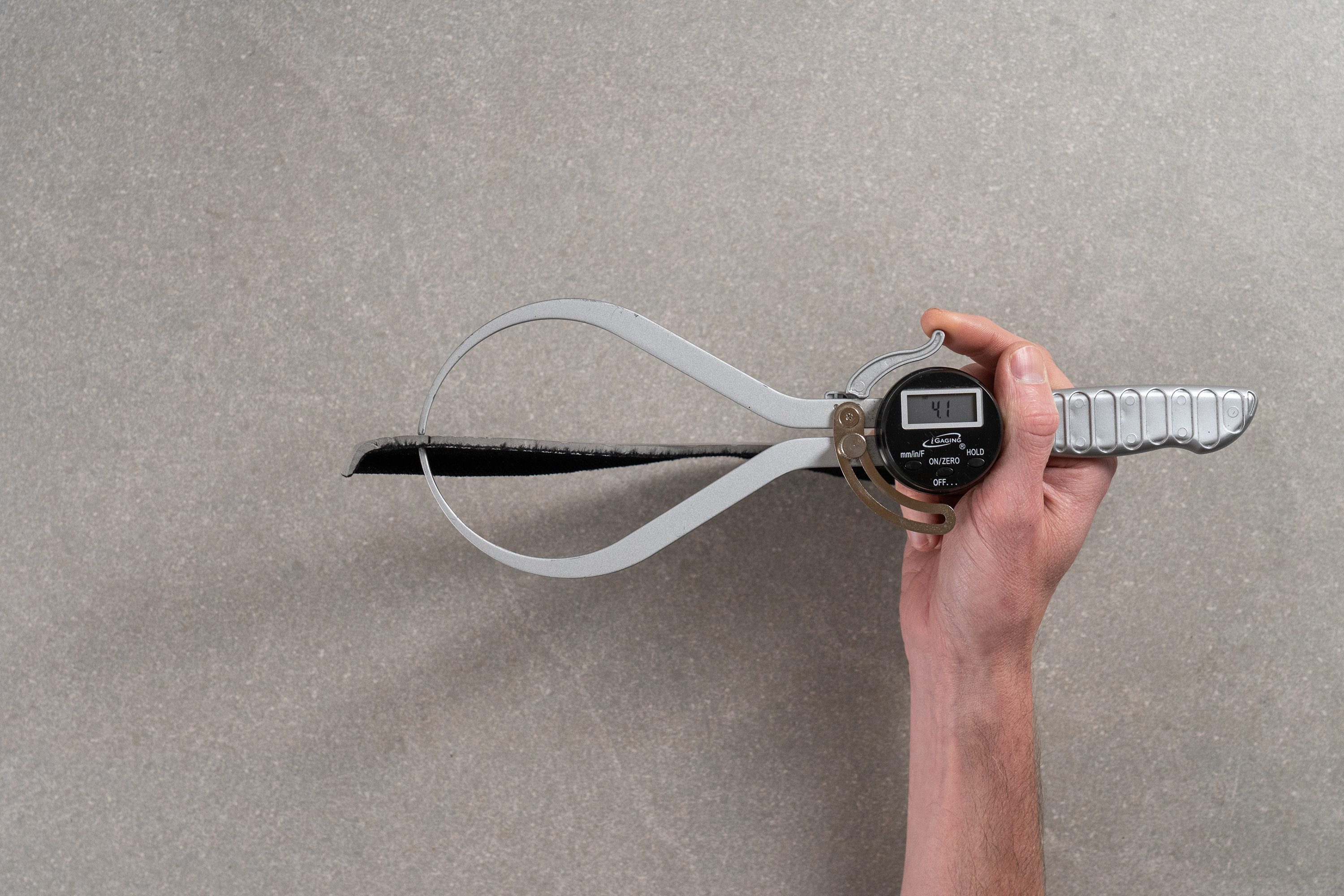
| Nano X4 | 4.1 mm |
| Average | 4.0 mm |
Removable insole
The shoe's insole can be easily removed and replaced with an insert of your choice.
This could be a good remedy for flat feet as the shoe's stock insole has a bit of a bump on the inner side. We think that people with flat feet may find it rather annoying.
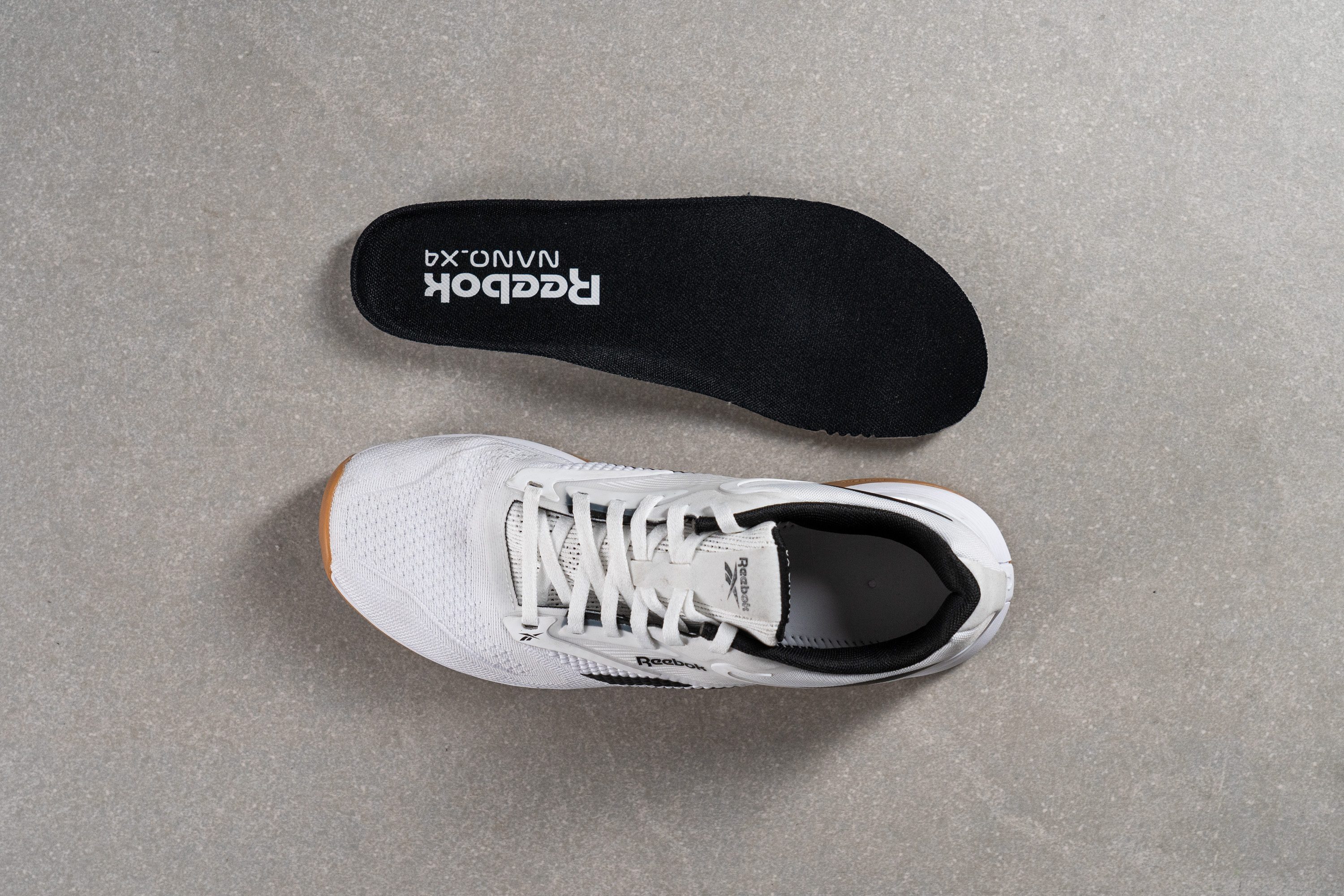
| Nano X4 | Yes |
Reflective elements
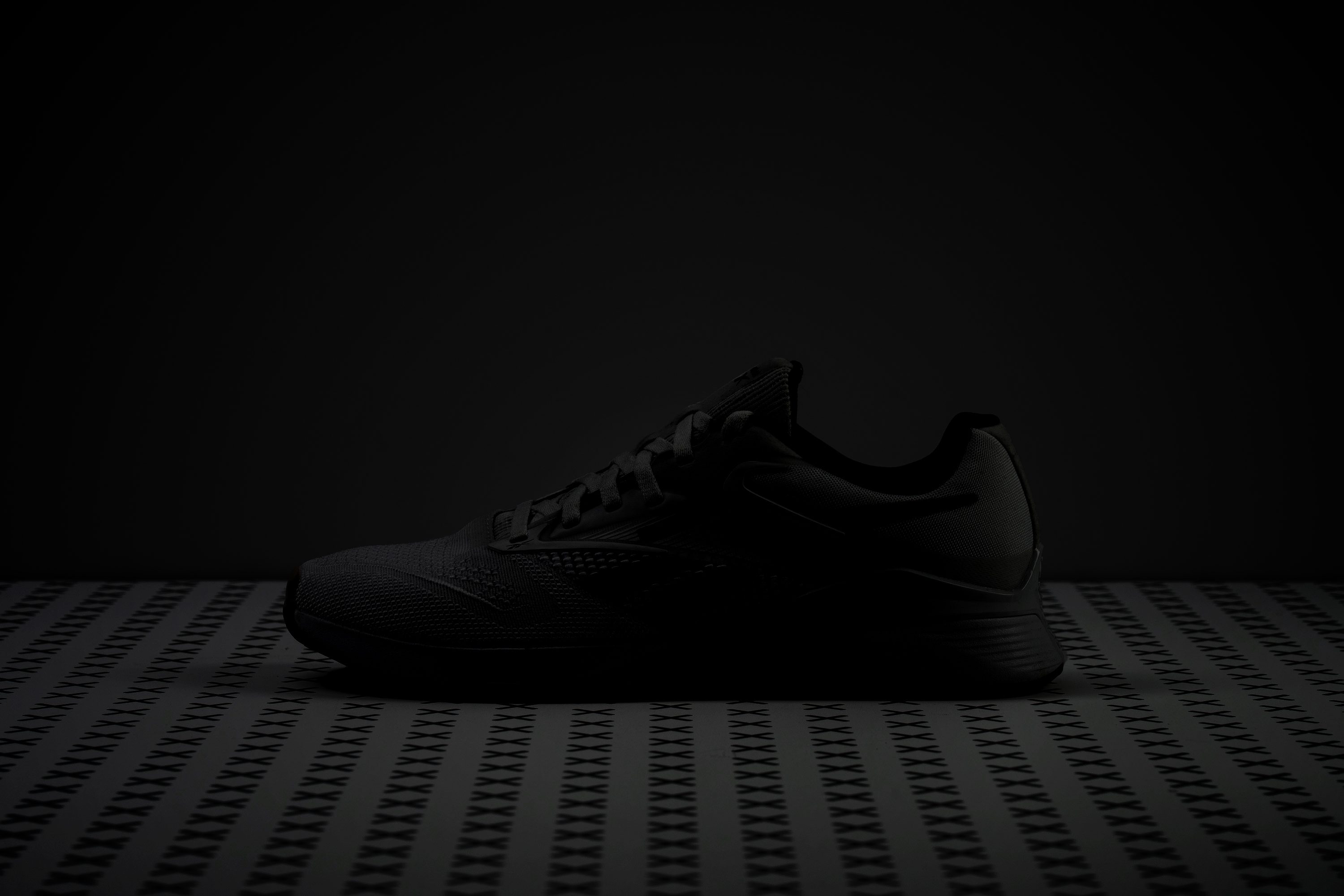
Tongue padding
The padding inside the Nano X4 is moderate but on-point. The tongue is not particularly puffy, showing only 4.3 mm of thickness on our caliper.
It is just enough to buffer the lace pressure without making the shoe heavier or less breathable.
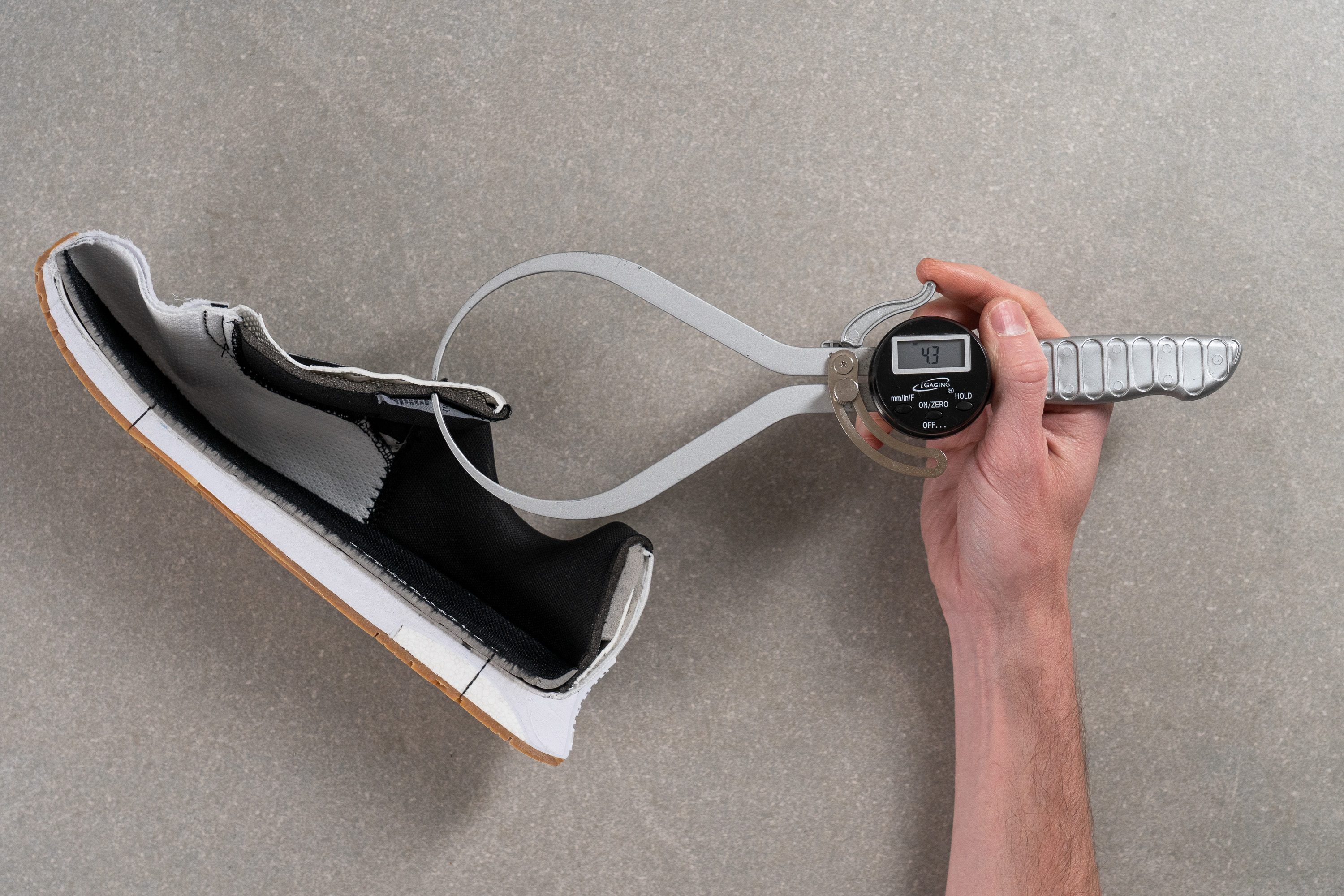
| Nano X4 | 4.3 mm |
| Average | 5.7 mm |
Heel tab
This Reebok shoe doesn't come with a heel tab or loop but it's easy to get on thanks to the stiff and structured heel counter.
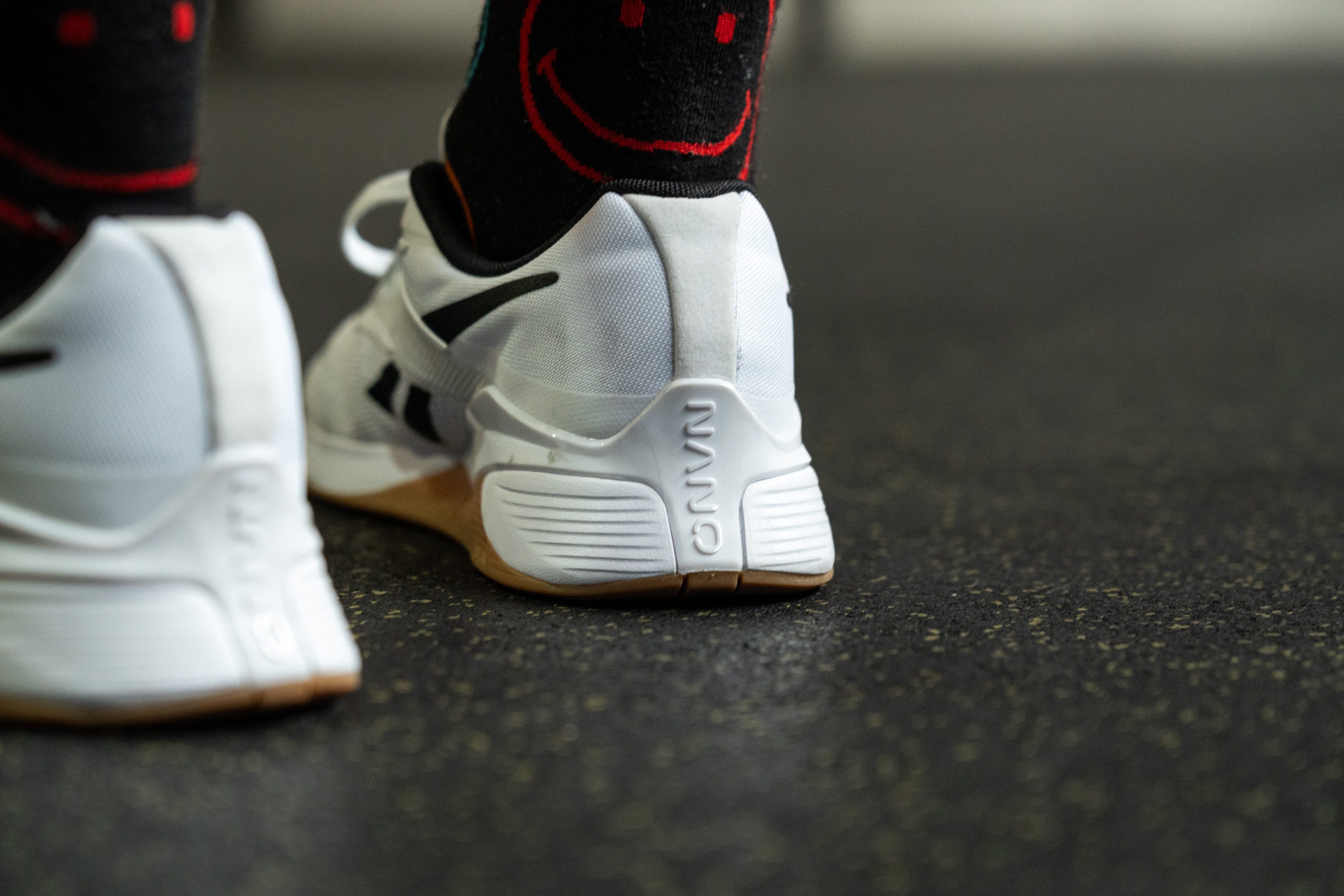
| Nano X4 | None |
Tongue: gusset type
At long last.... we got it. A fully-gusseted tongue, ladies, and gentlemen!
The tongue of the Nano X4 is attached to the upper on both sides which means no more need to adjust it mid-workout.
Not only does it stay in place, but this tongue design also contributes to a better foot lockdown inside the shoe.
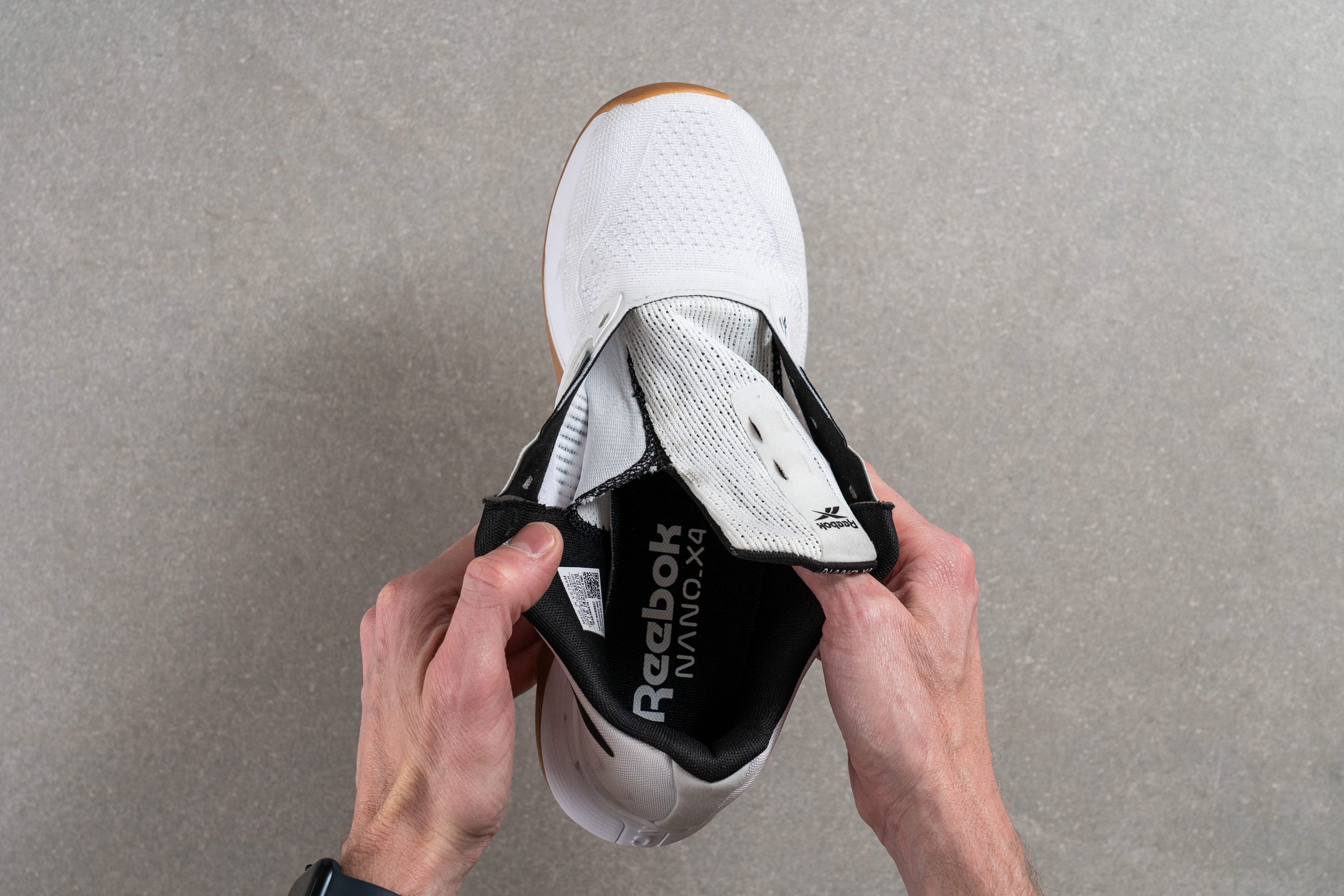
| Nano X4 | Both sides (full) |

